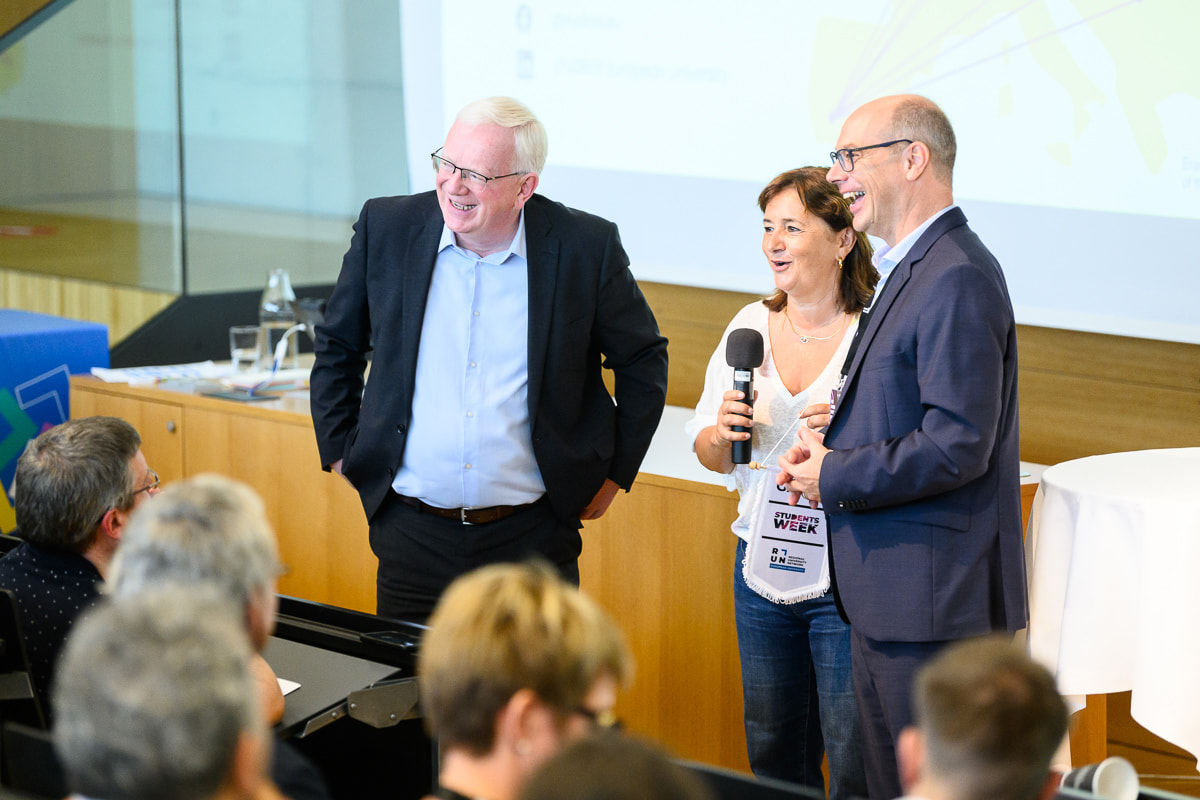NEWS
RUN-EU 2024 Students Week & General Assembly at FHV: Paving the Way for the Future
17 September 2024
More than 280 RUN-EU students, researchers, academic staff and associated partners from various countries and fields, ranging from industry and business to regional government and civil society, met at the Vorarlberg University of Applied Sciences (FHV), in Dornbirn, Austria, from 2 to 6 September.
This meeting marked the fourth RUN-EU Students Week (SW) and General Assembly (GA) and was attended by the CEOs/Rectors/Presidents of the eight-member universities.
The week of events was an opportunity for the RUN-EU Management bodies (Governing Council, Strategy Steering Group, Executive Management Board, Advisory Boards and Councils and Work Packages), to meet once again in person and reflect on the achievements of the fourth year of the Alliance and first of the new funding period, to strengthen cooperation, improve inter-regional collaboration between all members and associated partners, and to plan for the future of RUN-EU.
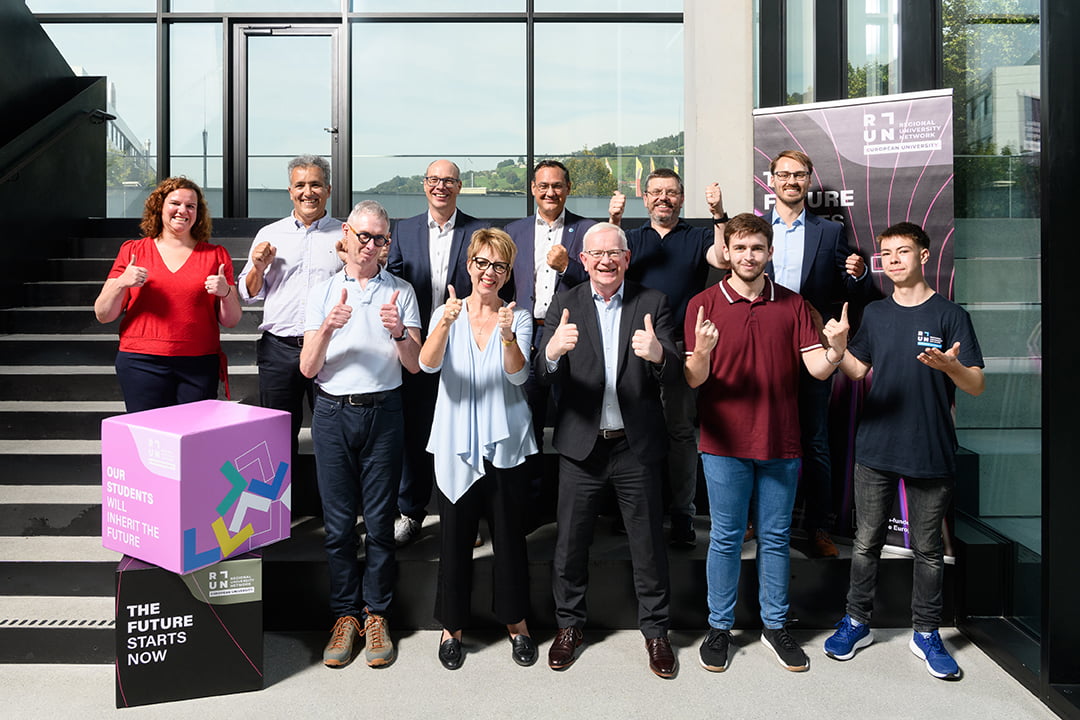
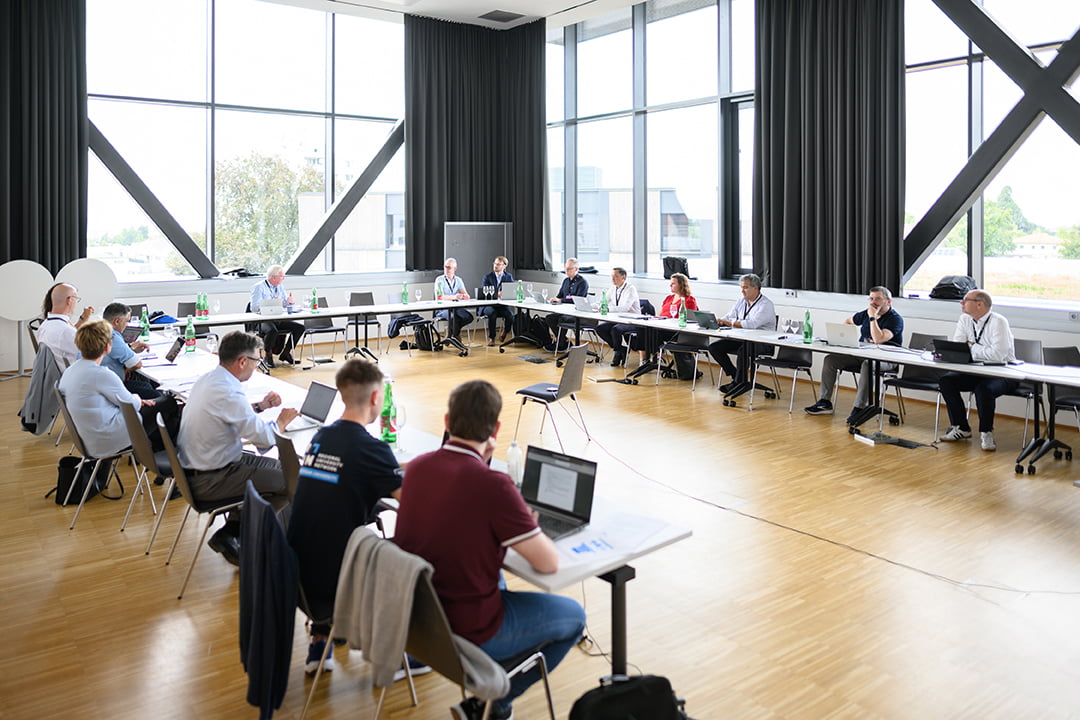
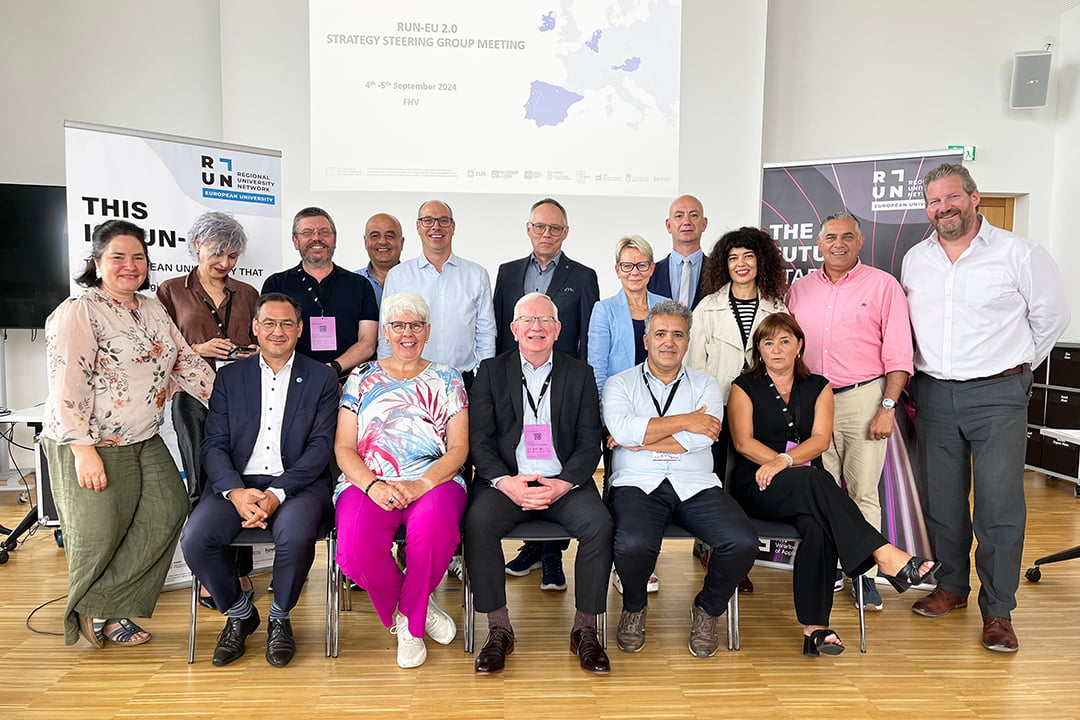
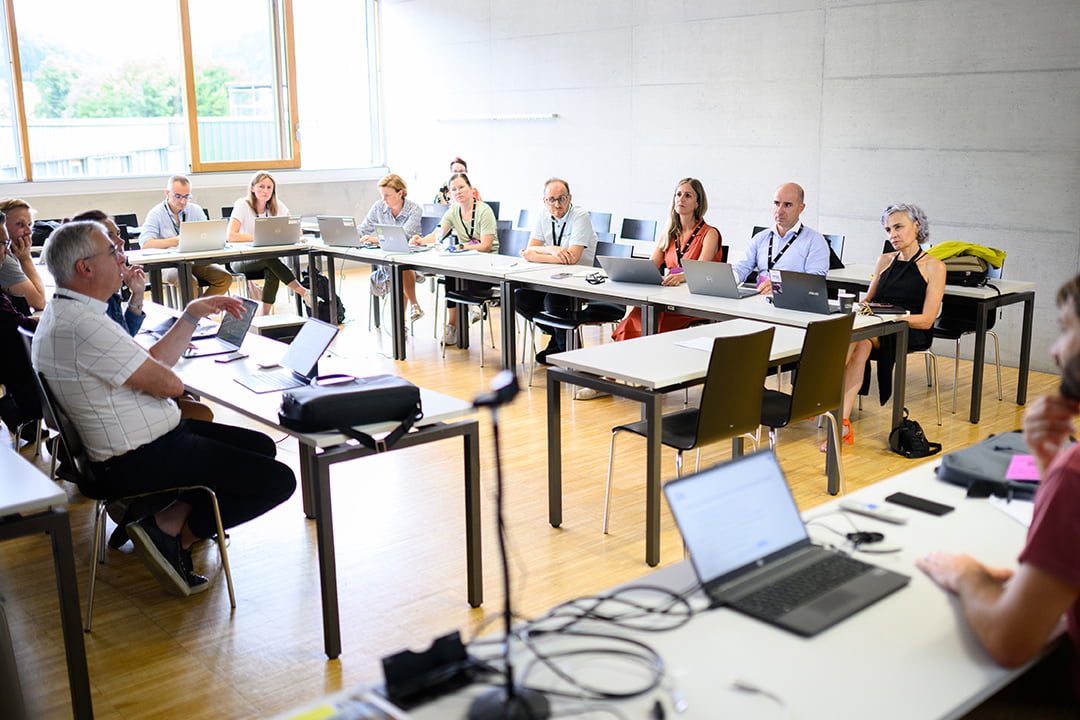
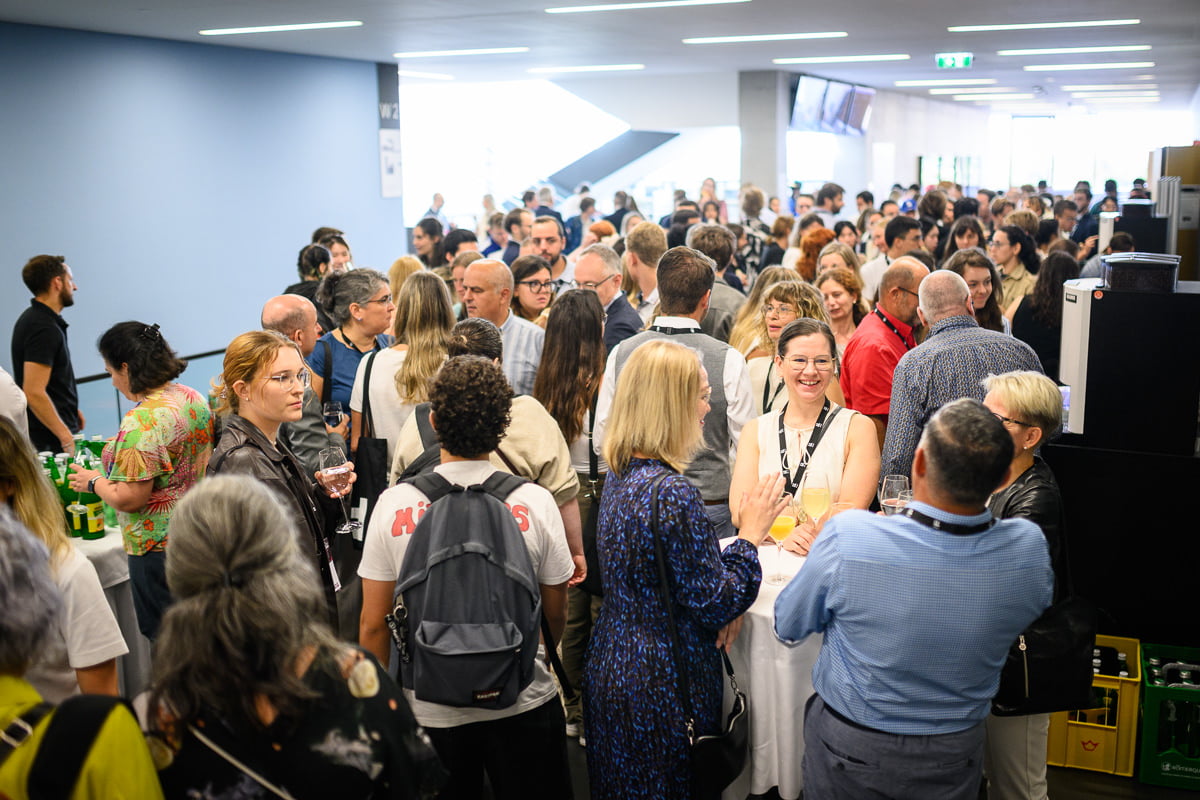
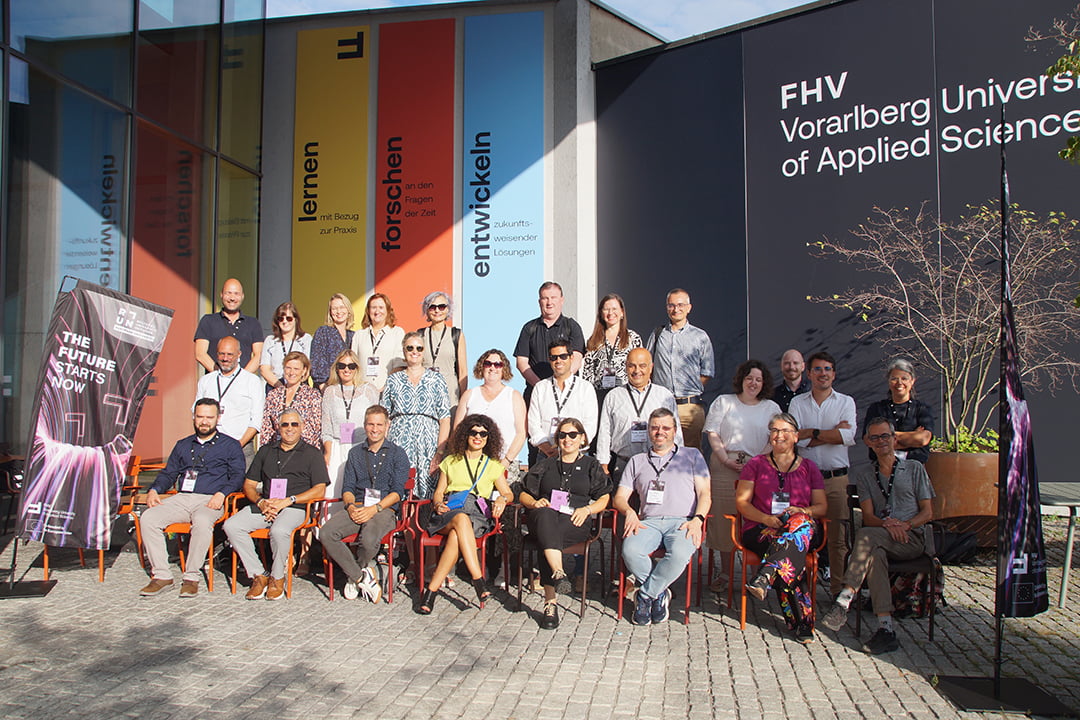
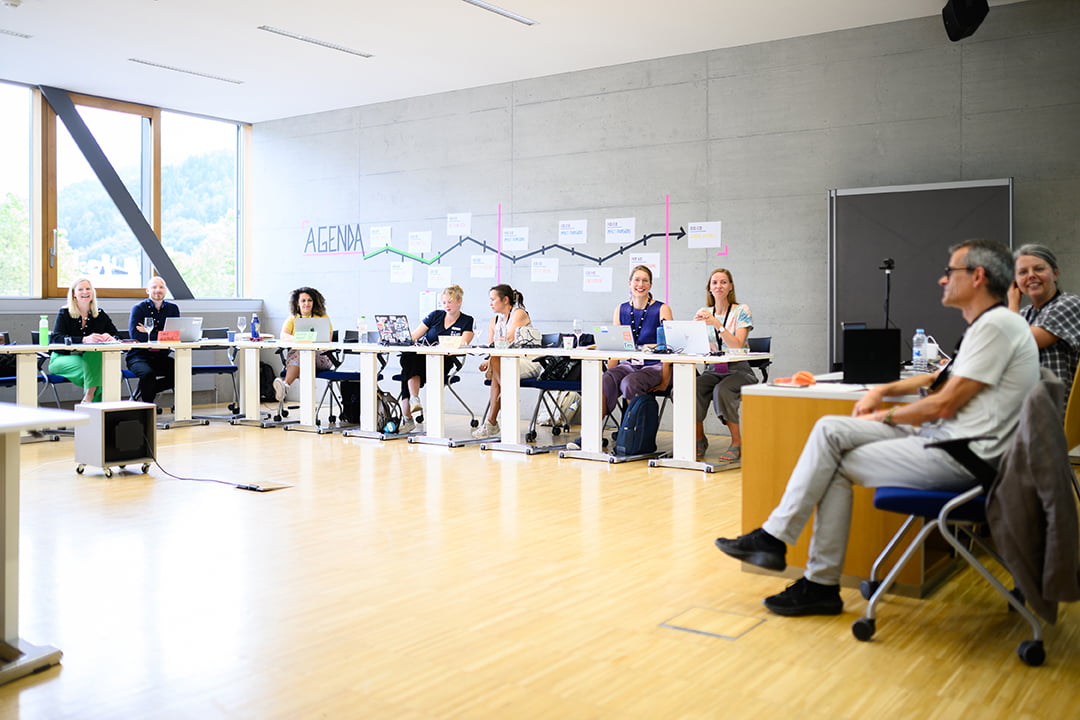
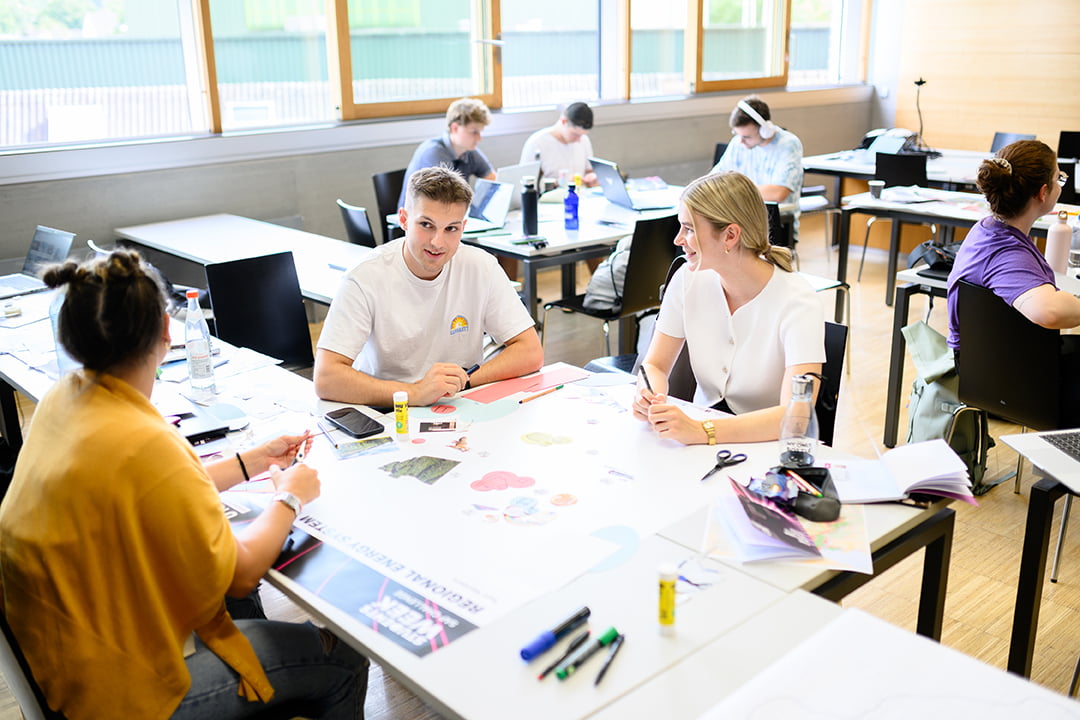
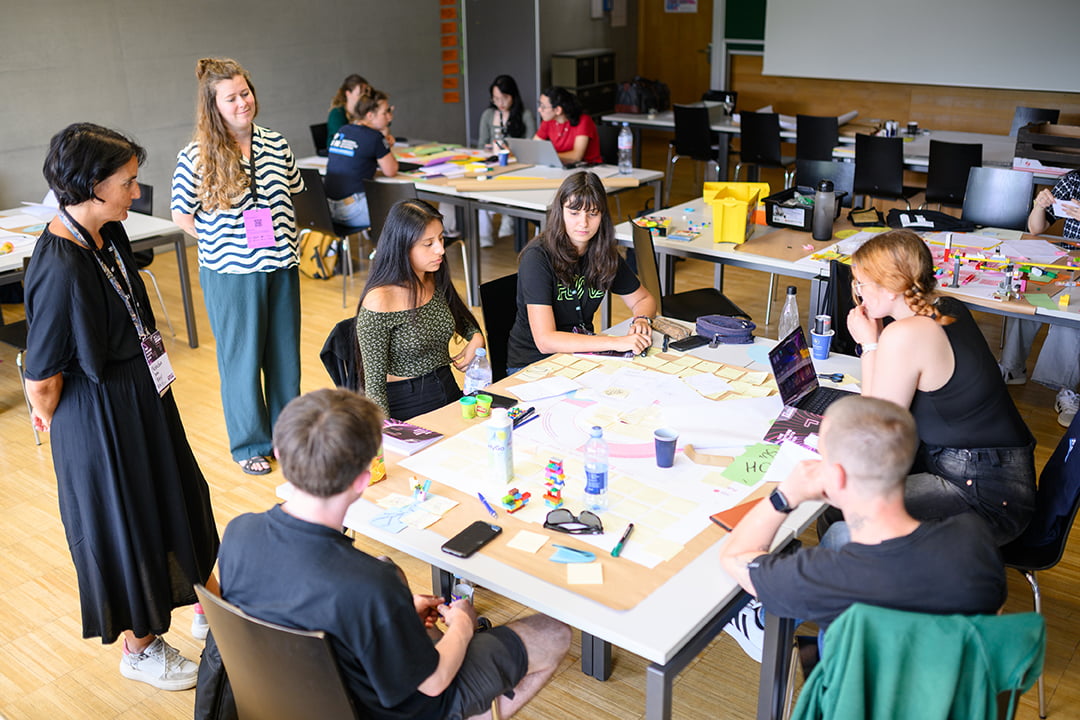
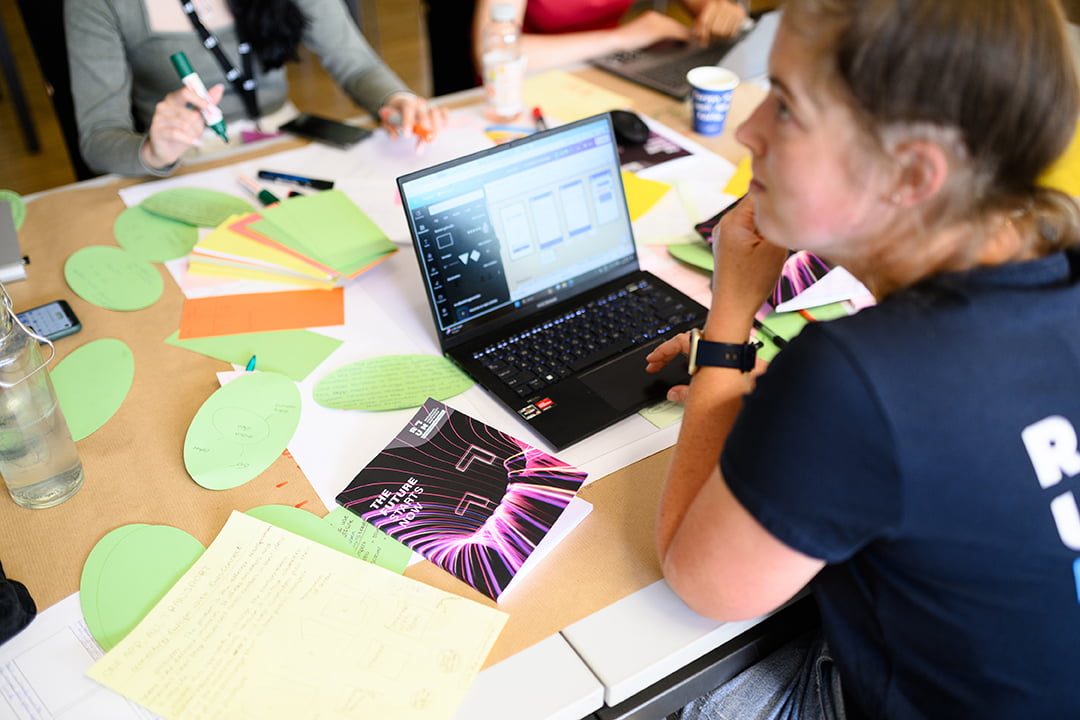
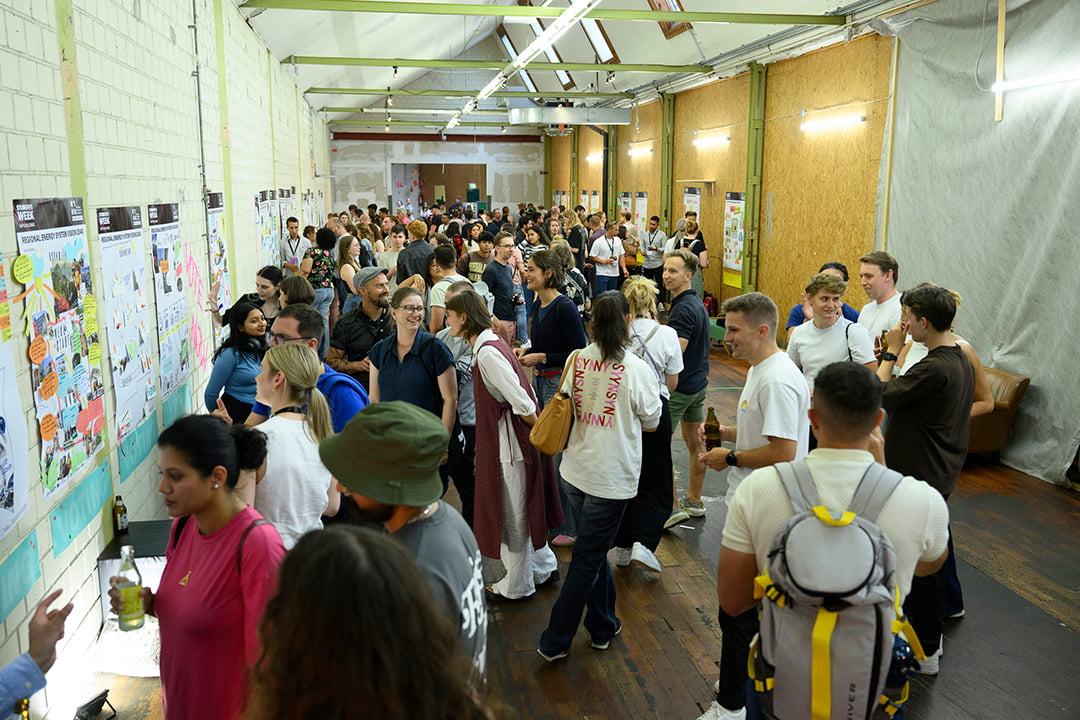
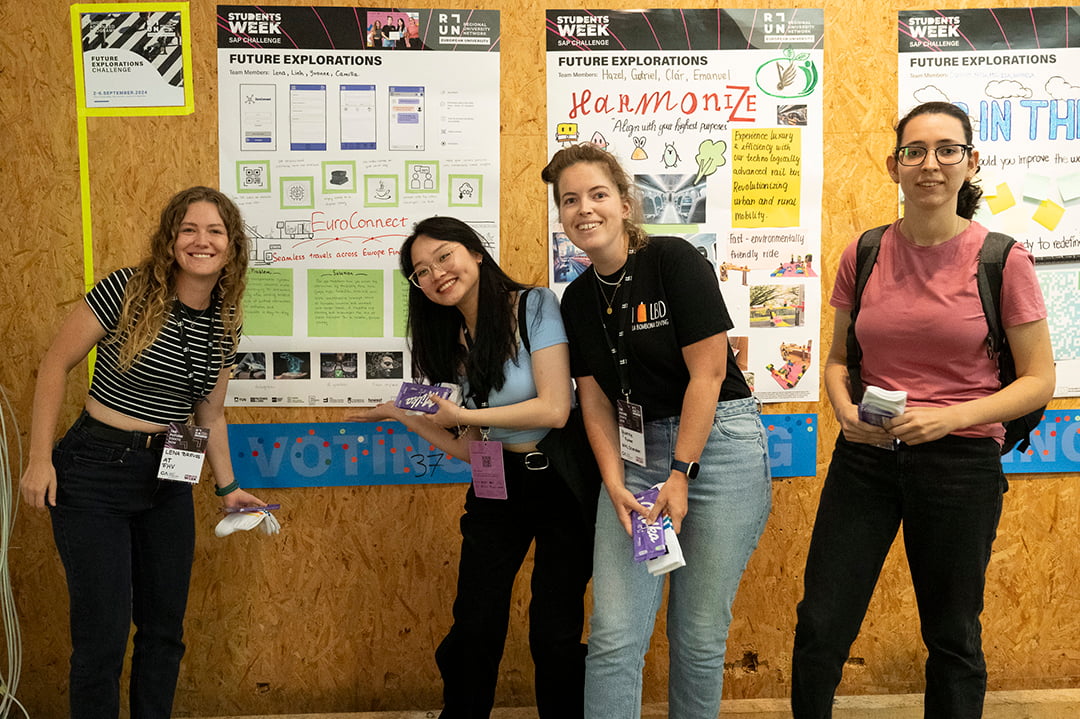
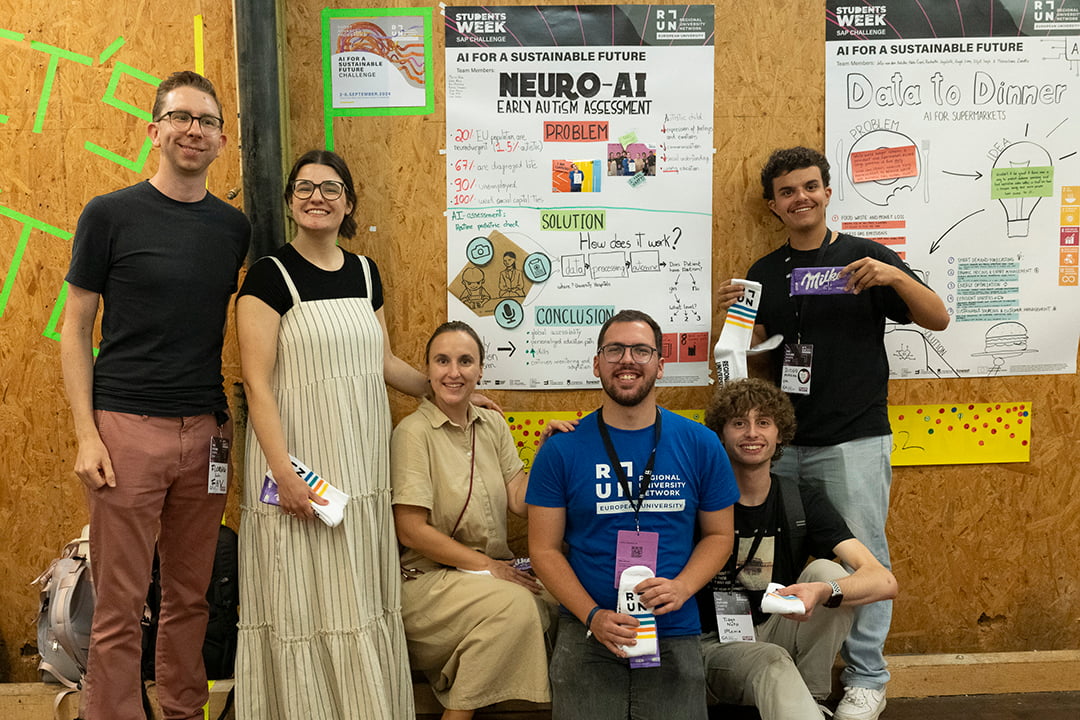
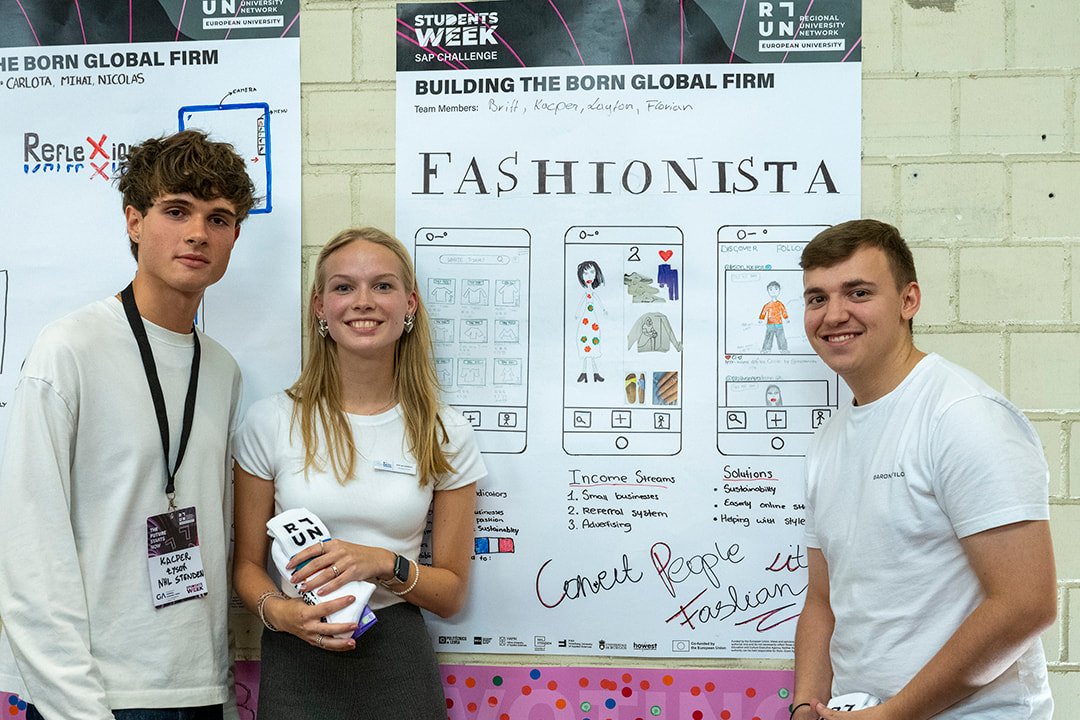
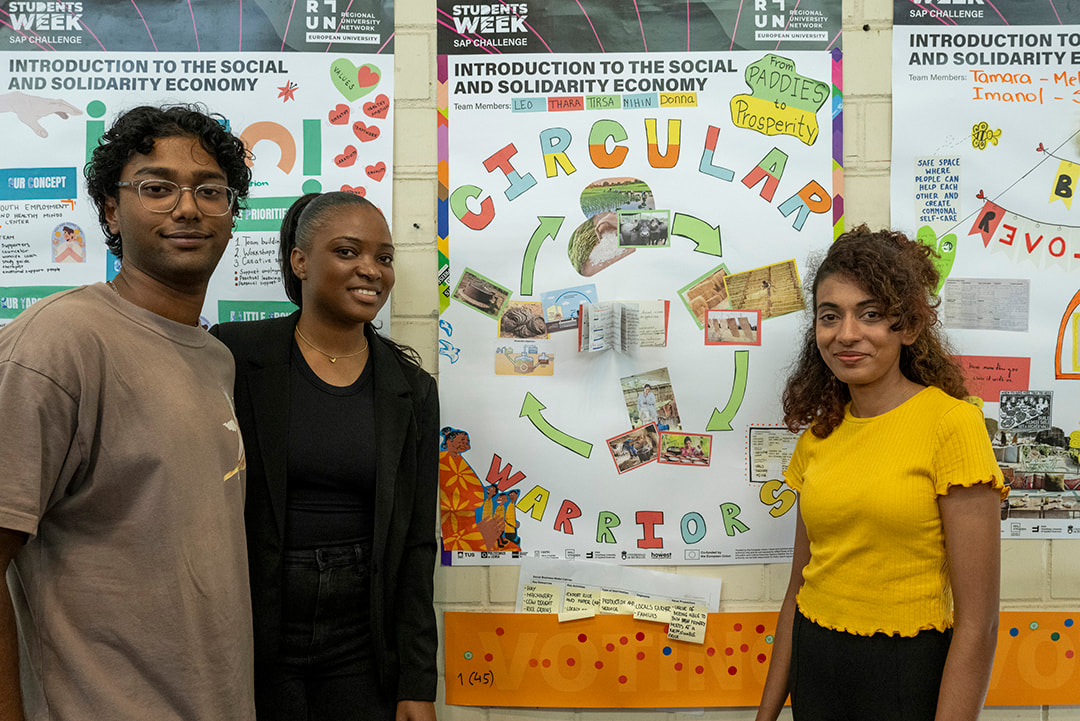
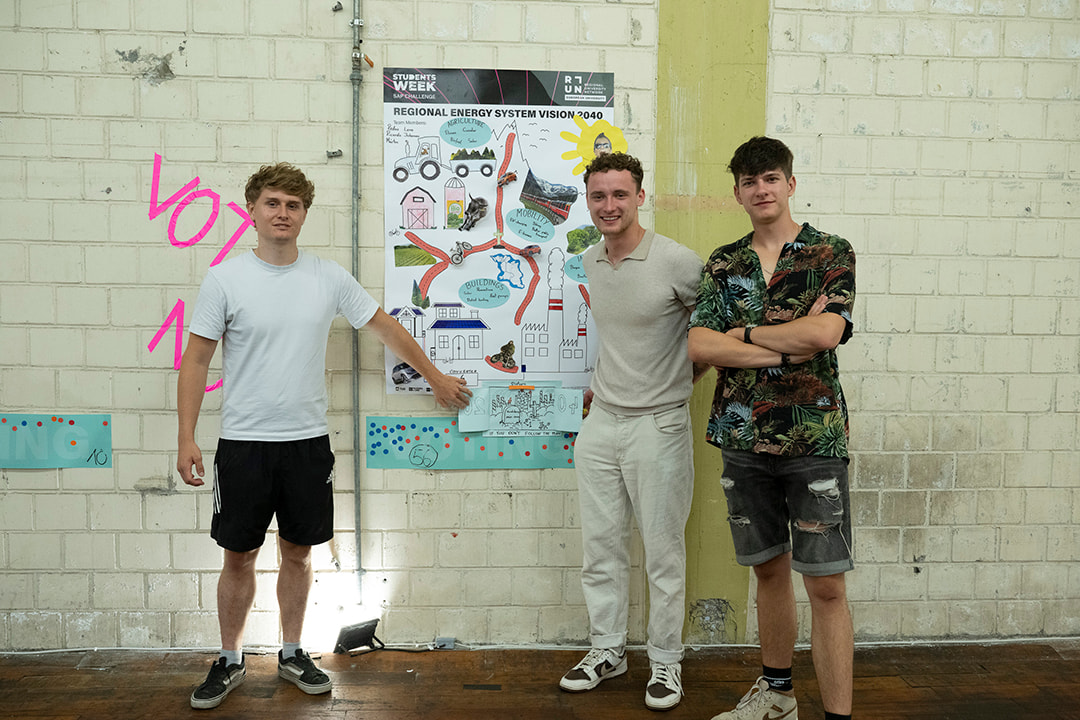
Students Week
Throughout the Students Week, 120 student representatives from the eight-member universities participated in five different Short Advanced Programme (SAP) Challenges:
- Future Explorations Challenge
- AI for a Sustainable Future Challenge
- Building the Born Global Firm Challenge
- Introduction to the Social and Solidarity Economy Challenge
- Regional Energy System – Vision 2040 Challenge
The SAP Challenges themes provided students with a multidisciplinary learning environment within the framework of the UN Sustainable Development Goals (SDGs), supporting them with tools to innovate, strengthen the importance of people in the economy and influence the future of society. For each challenge, they had to develop innovative, sustainable, real-life solutions.
On the afternoon of 5 September, the students presented their final work in the CampusVäre.
For each of the five SAP Challenges, the poster with the most votes was voted to be presented at the General Assembly.
General Assembly
Opening Session
The RUN-EU General Assembly brought together the entire RUN-EU community to review and celebrate the excellent work done by the Alliance in its first four years and the achievement of the proposed objectives for the creation of a true pan-European university, providing future and advanced skills programmes and becoming a driver of regional development.
RUN-EU representatives reviewed the Alliance’s, objectives, achievements and next steps.
The President of the Technological University of the Shannon (TUS), and Coordinator of RUN-EU, Vincent Cunnane, opened the meeting by warmly welcoming everyone.
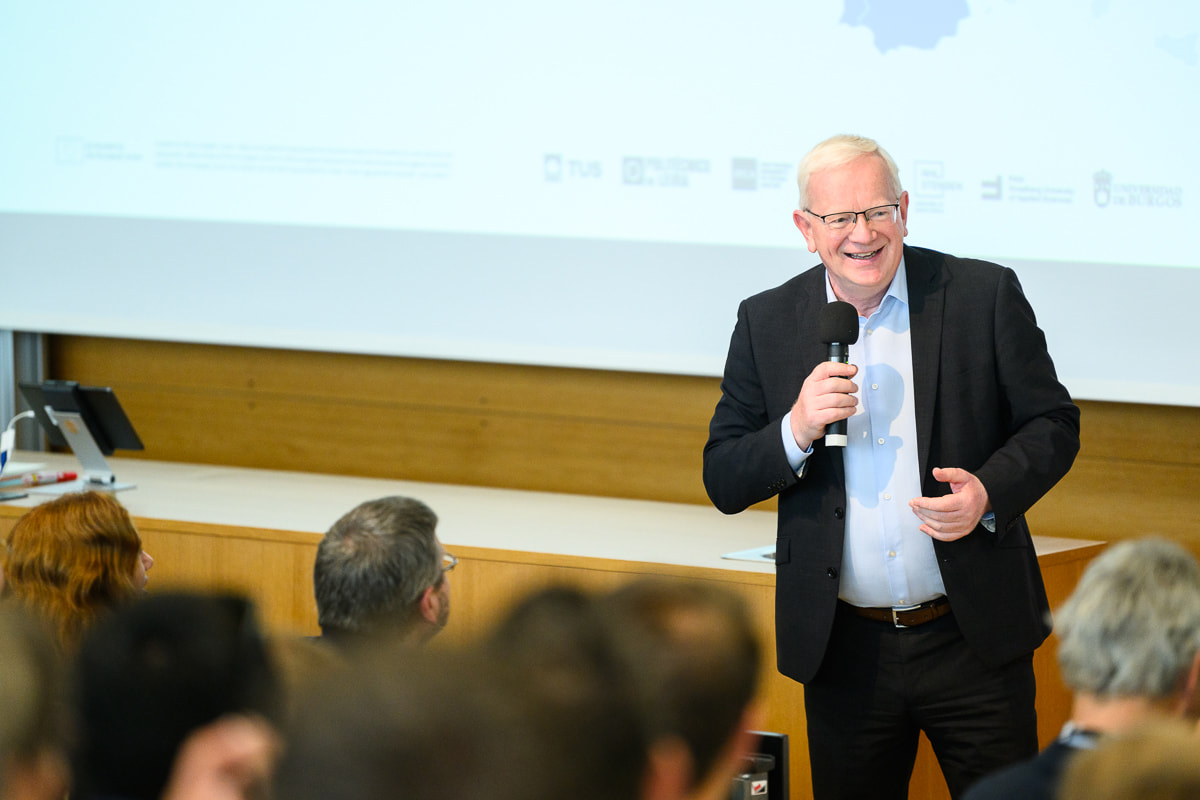
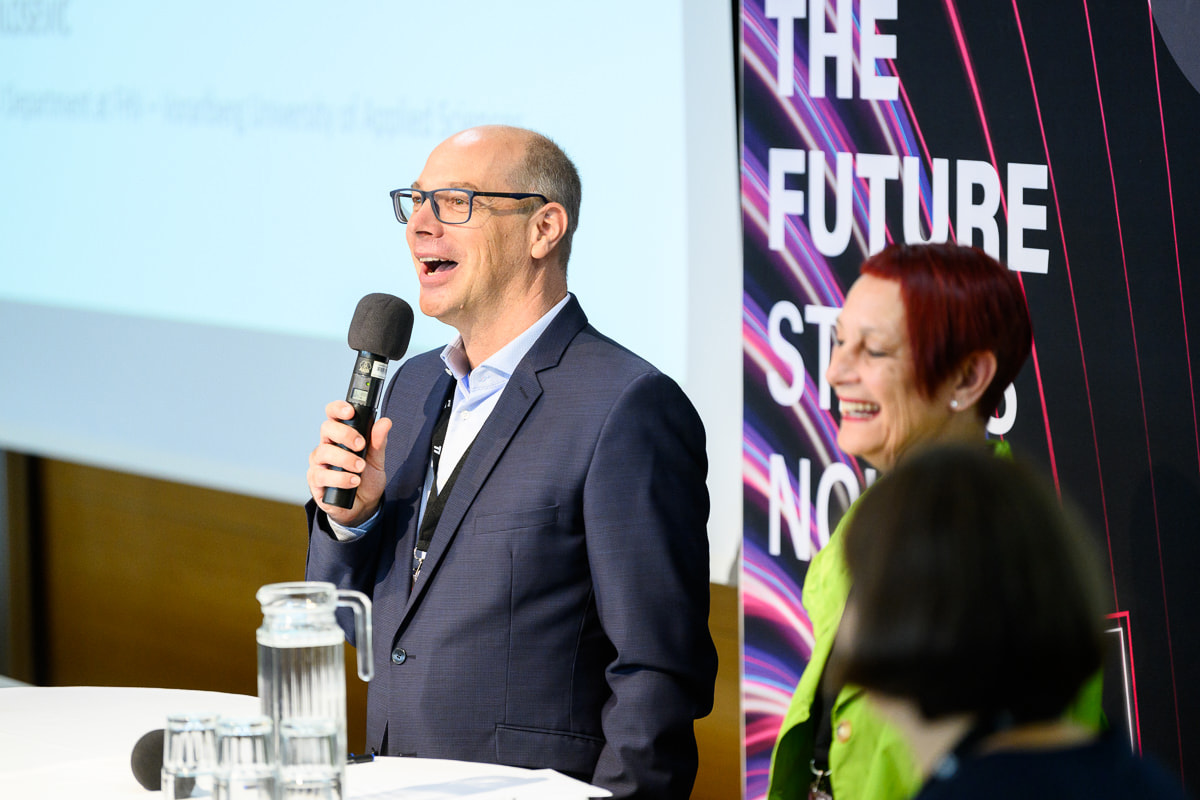
‘First of all, let me welcome the students. It’s all about you, it’s a great pleasure having you here.’
He then added: ‘It’s a great honour for us to host this fourth General Assembly. I know it’s the first of the second cycle, but we tend not to call it the second cycle (…) It won’t be cycles, it will be ages and years and years.’
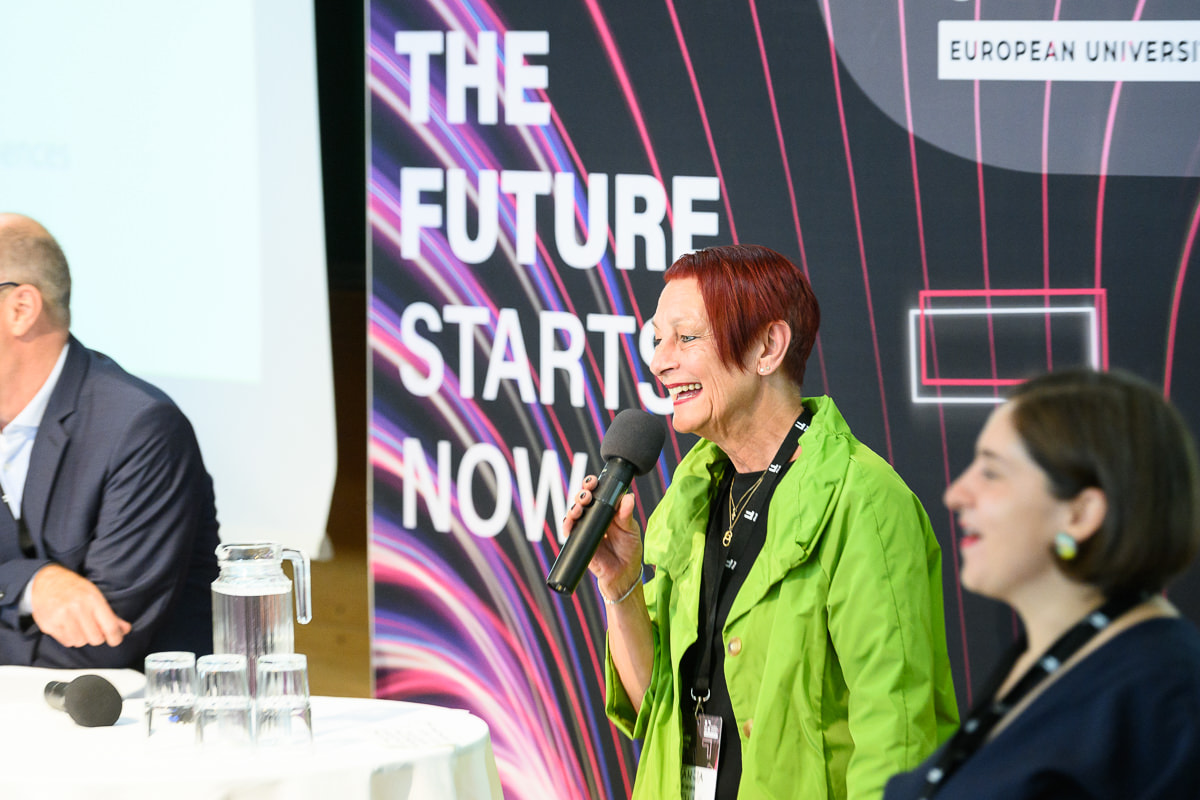
‘With every year of cooperation, we come closer to the goal of coming together and working together to be one university. Our students once said: We are One, we are RUN. And we are getting closer to this goal.’
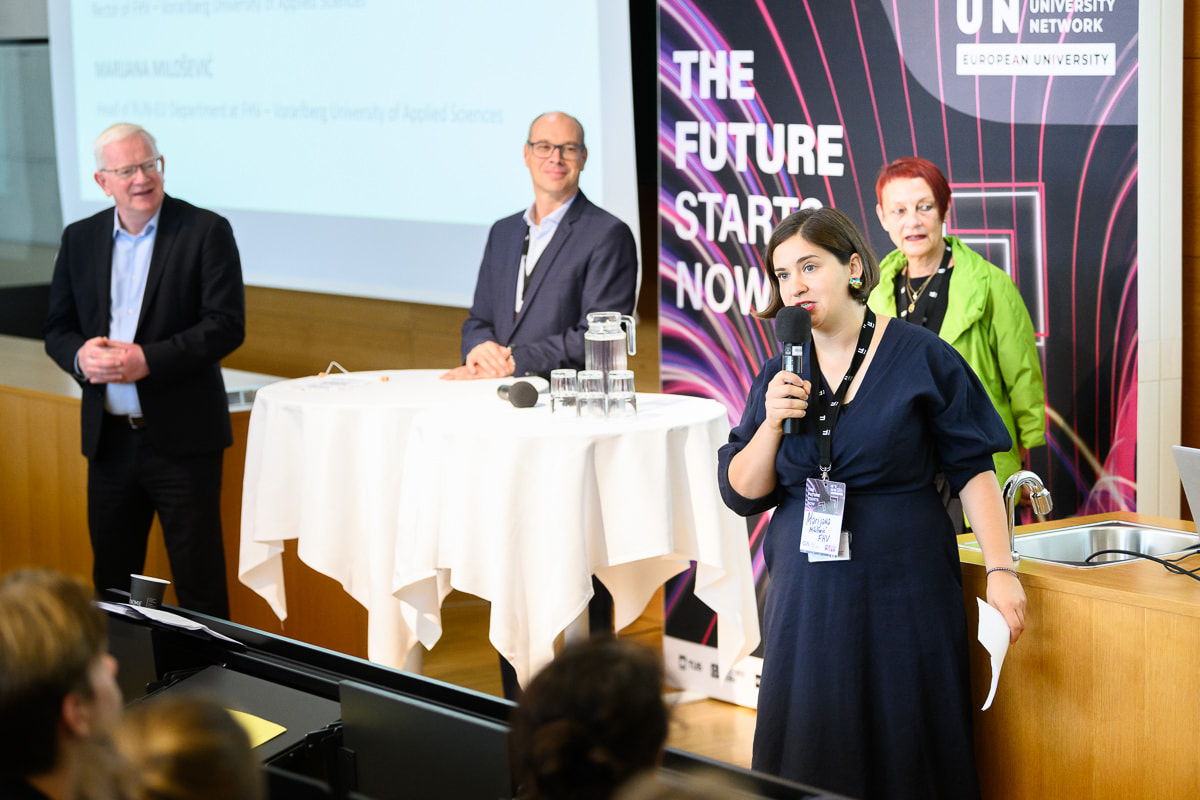
‘For me, it has been a rewarding experience to witness FHV transforming into a true Campus of our European University this week’.
She concluded by thanking the 70 FHV team members who helped organise the week’s events.
Students’ Week Presentations
The most voted posters of the Student Week were presented at the General Assembly.
Five groups of students took to the stage to present their brilliant ideas and final presentations for each of the five SAP Challenges.
EuroConnect: Seamless Travels Across Europe is Finally a Reality
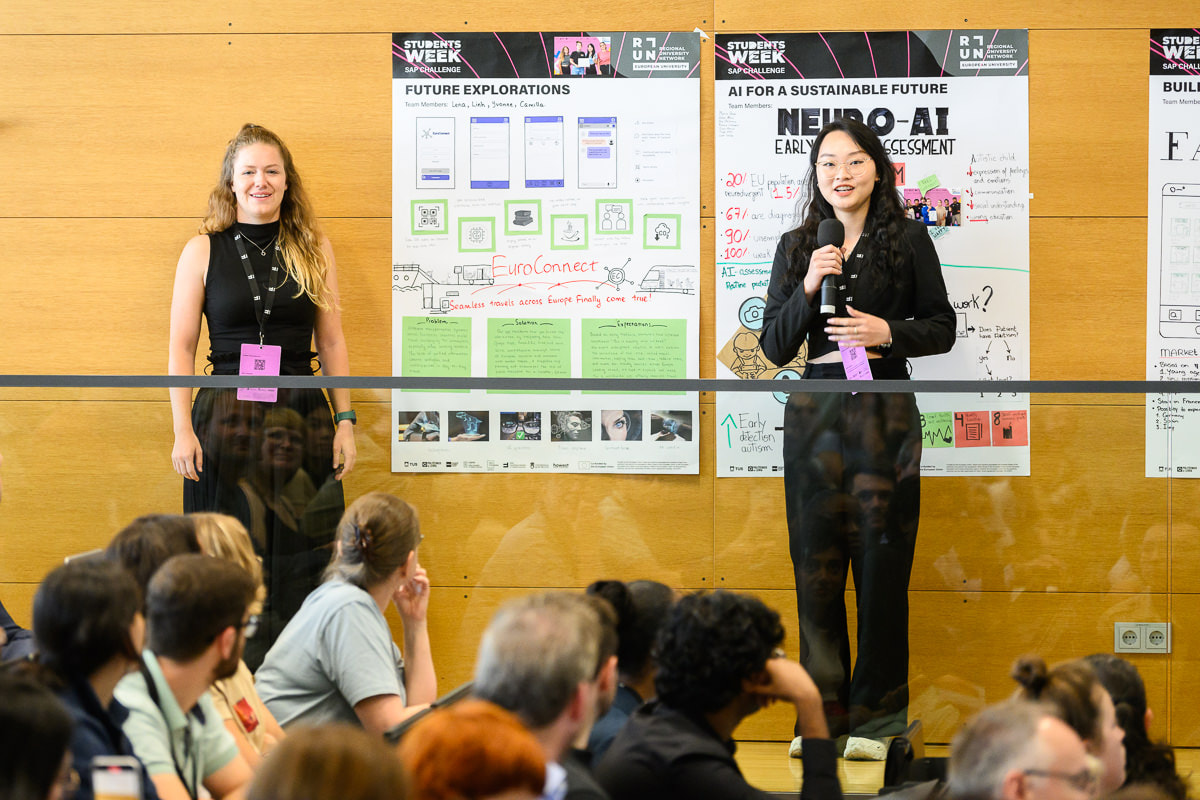
In the Future Explorations Challenge, the students explored how to playfully improve business travel and commuting for employees and citizens in the Lake Constance region. This challenge was presented by a local customer, the Sustainable Mobility Lab. Through a design sprint, the groups developed creative ideas and explored innovative approaches for a shared future.
The winning poster was EuroConnect, an accessible app with the slogan ‘Seamless travel across Europe is finally a reality’.
‘The multilingual app aims to make travelling by public transport easier and more attractive. It has a chatbot that answers questions in both written and spoken form. It also collects the traveller’s train and bus miles/kilometres in a reward system. The rewards can be exchanged for discounts in different shops.
It also measures how much CO2 each traveller saves by using public transport and allows competition with friends to find out who is more sustainable.
Long-distance commuters who use the app and take the same train every day can have their seat that turns into a private space with curtains that can be closed and a locker to store a book, for example, making it a more personal and comfortable journey.
The app can be used anywhere, not only through smartphones but also through new future technologies such as smart glasses or even a head implant.’
NEURO-AI: Early Autism Assessment
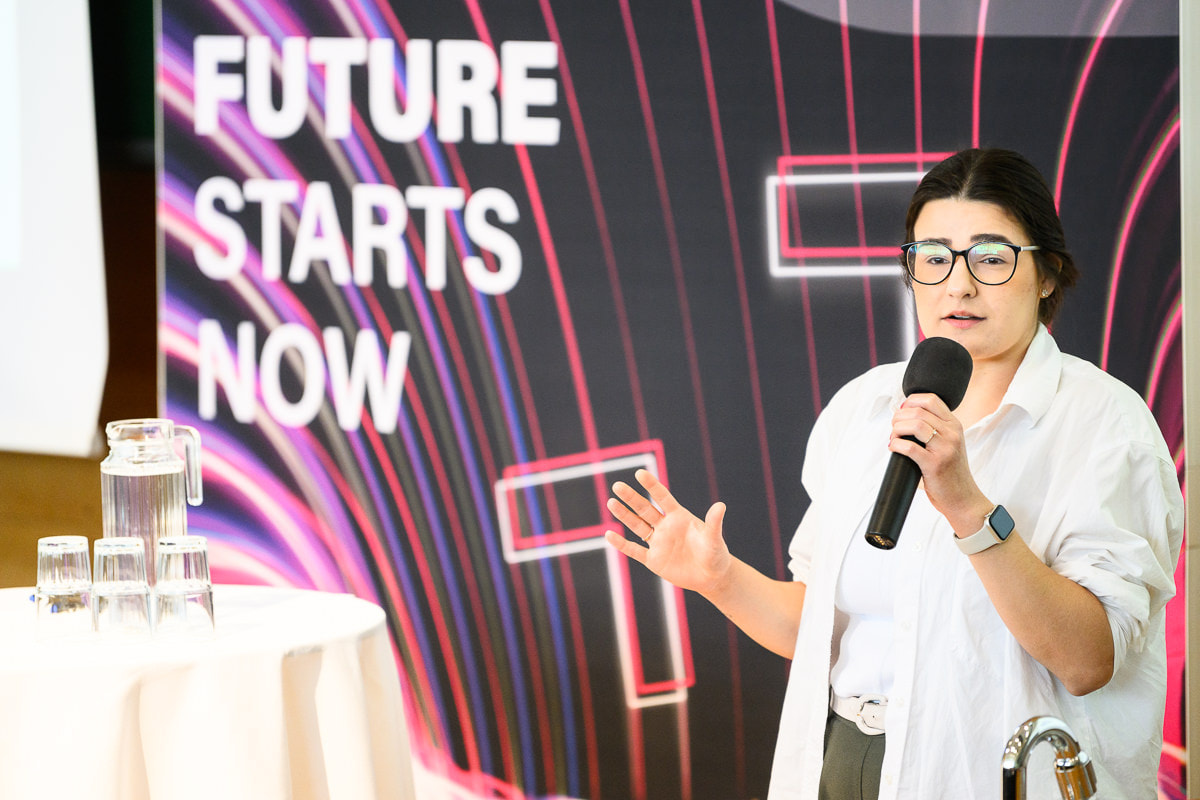
Artificial Intelligence is already a big part of our world but the question of its real potential remains underexplored. This challenge aimed to explore the real and important applications of AI to make the world a better place.
The winning poster for the AI for a Sustainable Future Challenge was NEURO-AI – Early Autism Assessment, which is a sensor system that tracks movement, voice pattern and facial expression changes, to assess children’s behaviour in routine pediatric consults. The data goes through an AI processing database that will then answer the physician with data such as:
- is the child autistic?
- If the answer is yes, what level of autism does the child have?
That data will then be sent to Specialists for further evaluation.
‘Autistic people have a hard time naming their emotions and expressing their feelings. They also have a hard time communicating in social interactions. Nowadays, 1.5% of the European population is autistic. Of those, 67% were late diagnosed.
Early diagnosis would allow us to cater education to autistic people to help them improve their social interaction and train them throughout their early formative years to be better involved in society. That would help to decrease the astonishing amount of 90% unemployment for autistic people.
In a very simple method to implement in the yearly evaluation routine of children’s physical well-being, their mental well-being will be assessed as well, hoping to improve global accessibility of autistic people and just improve their overall social skills and interaction levels.’
FASHIONISTA: Connecting People With Fashion
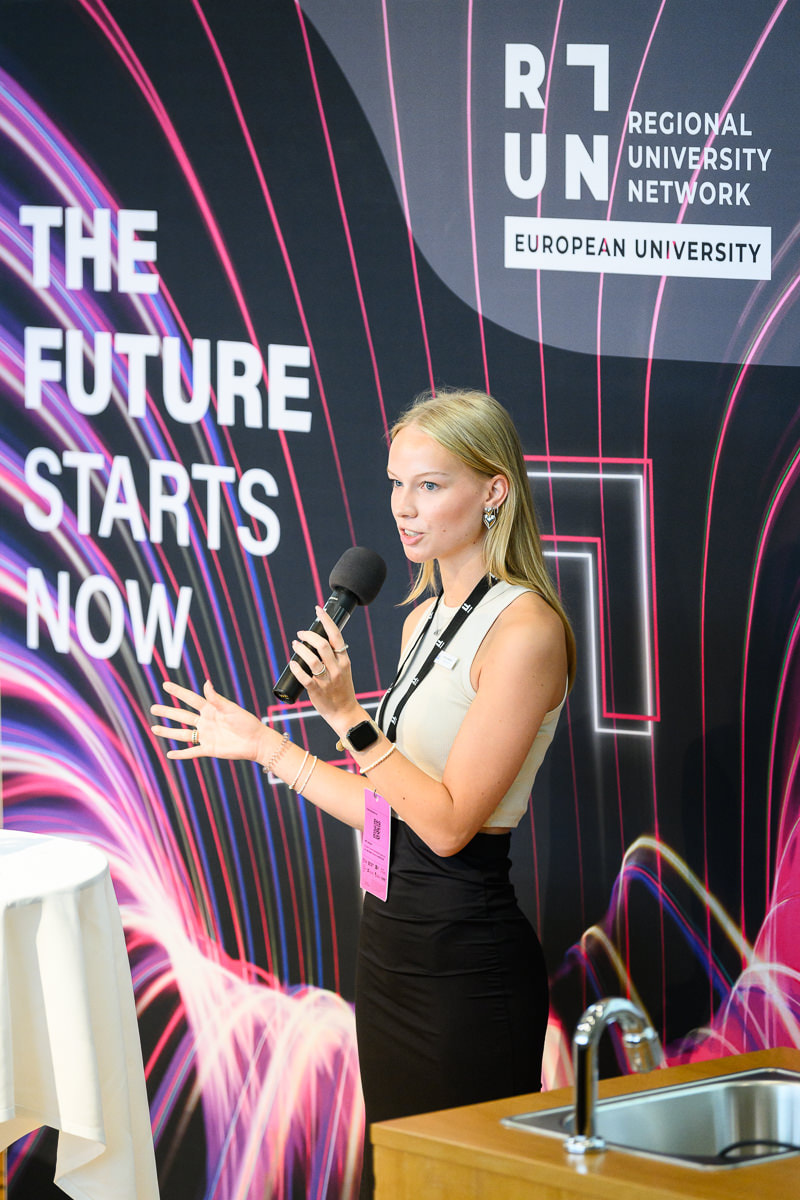
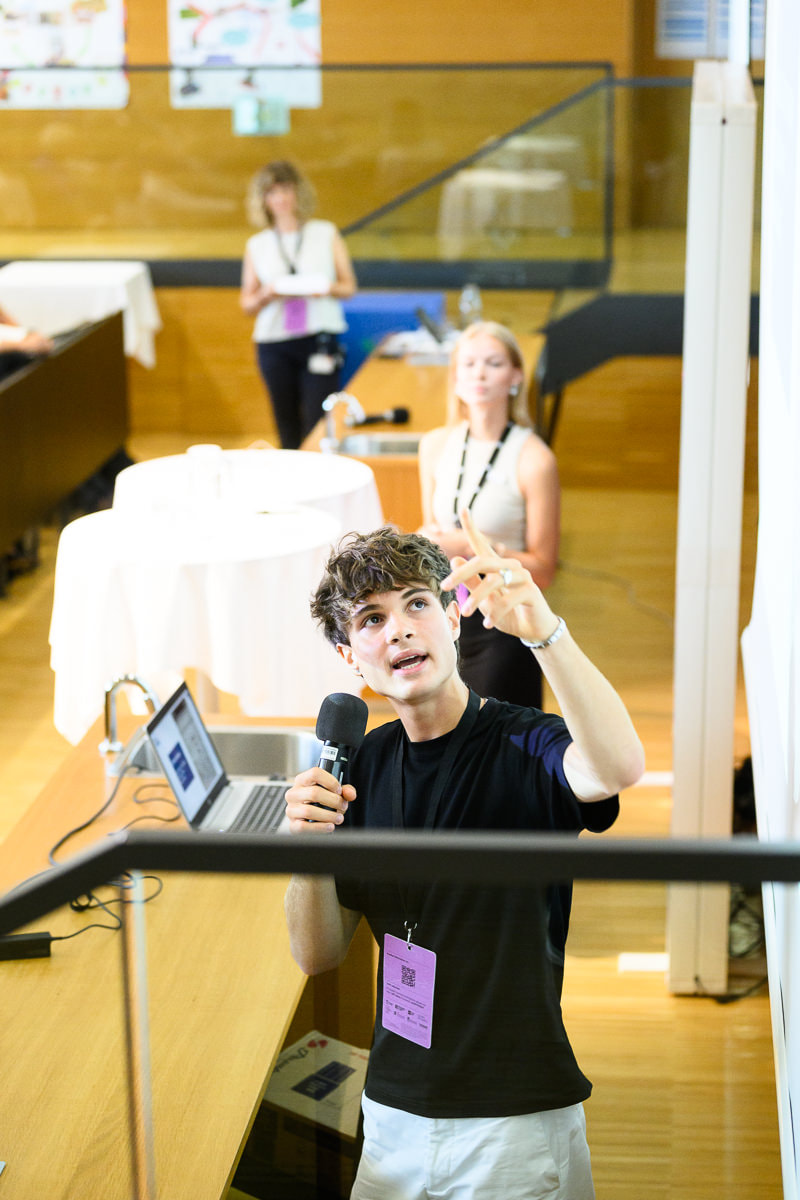
The Building the Born Global Firm Challenge aimed to create an international strategy for startups, helping them to reach Global markets from day one. This SAP highlighted that the world feels small and is yet full of opportunities by focusing on what unites us and that even resource-scarce firms can transcend borders, drive positive change and foster innovation worldwide.
The winning poster was FASHIONISTA – Connecting People With Fashion, an augmented reality app where there is a virtual self, created with body measurements, height, or a body and face scan.
‘It allows trying clothing from several brands and check the fitting before buying, by clicking the option ‘Try Me’. On the ‘Search’ button, all brands can be searched and mixed. It’s perfect for people looking for inspiration but also for people who are already into fashion and want to discover new small brands. It also allows the posting of the outfit in a kind of Instagram mixed with TikTok, the creation of a wishlist, and your existing wardrobe. There is also a ‘Discovery’ page to get inspirations from other users outfits, a ‘Follow’ button, and it allows to know exactly where the outfits are from. The outfits can be bought in one click that redirects to the online shop of each brand.’
From Paddies to Prosperity
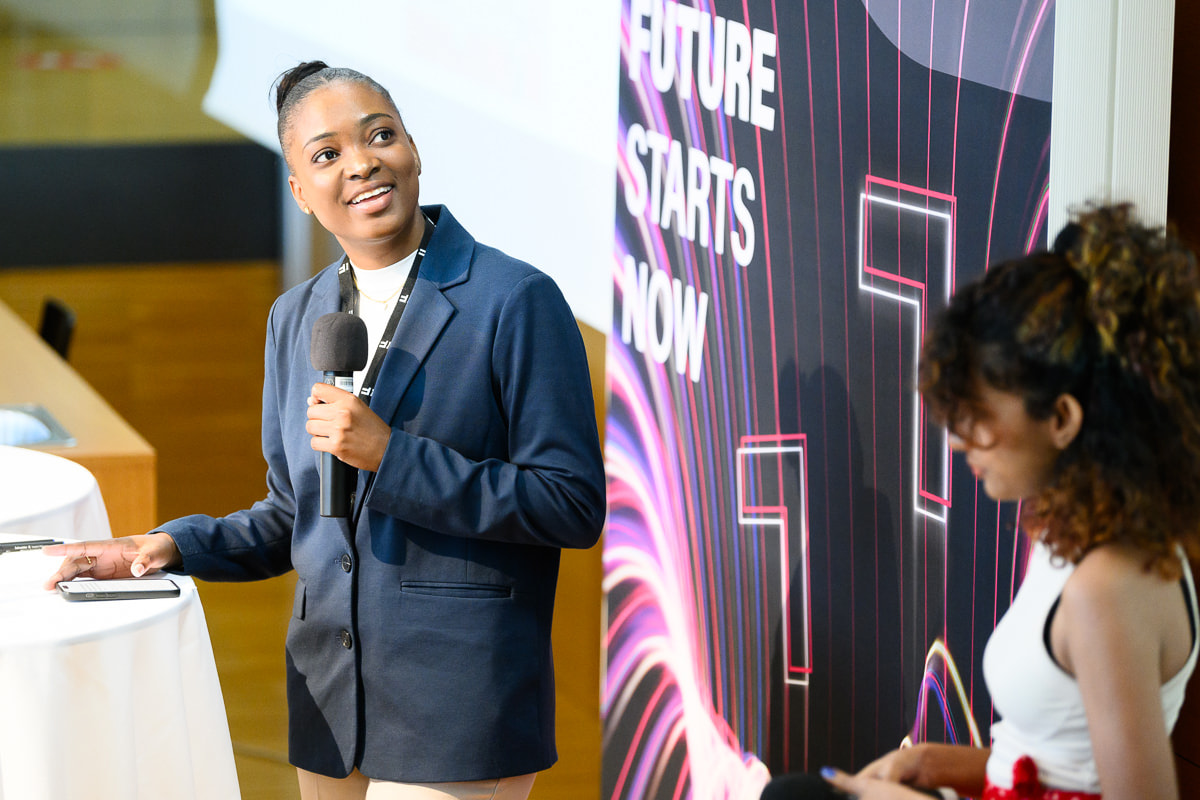
The Introduction to the Social and Solidarity Economy Challenge students received a concise and transdisciplinary introduction to the social and solidarity economy in the context of polichrisis the students were inspired by best practice examples and learned tools to unlock the potential of the social and solidarity economy in their communities and regions.
The winning poster was From Paddies to Prosperity.
‘In Sri Lanka, rice cultivation is the main agricultural crop but they are facing a huge economic problem because they don’t know how to use other kinds of byproducts to produce extra income.
After harvesting the rice grains, if the farmers can produce or manufacture paper products from the rice hay it will be a good income resource since all the paper and stationary products are imported from China, which is very expensive. So, if they start a paper production, they can sell it to local markets, educational institutes and companies.
Buffalos are widely used in agricultural fields to do the ploughing process, and their milk can be used to produce added value products like curd, yoghurt and other extra dairy products and sell them at local markets as a side business. Buffalo dun can be used as a source for manufacturing biogas. In Sri Lanka, LPG gas is almost all imported from other countries, and it’s a very costly product, so if the farmers can produce biogas themselves it will be a huge relief for them.
Encouraging them to have this extra business to empower themselves can help build an inclusive community where everyone has the opportunity to grow and thrive.
We want to make a social impact in this community with this business model canvas. The value proposition is empowering the people of this community by offering them new perspectives on their talents so that they can work with what they have, know what their true worth is and have a better life quality.
The outcome is very promising because we can also know that there will be a future where this community’s children will be able to go to school with breakfast, that there will be parents able to provide for their homes, it will become a pleasant and good place to live in a healthy environment.’
Regional Energy System Vision 2040 for the Province of Vorarlberg
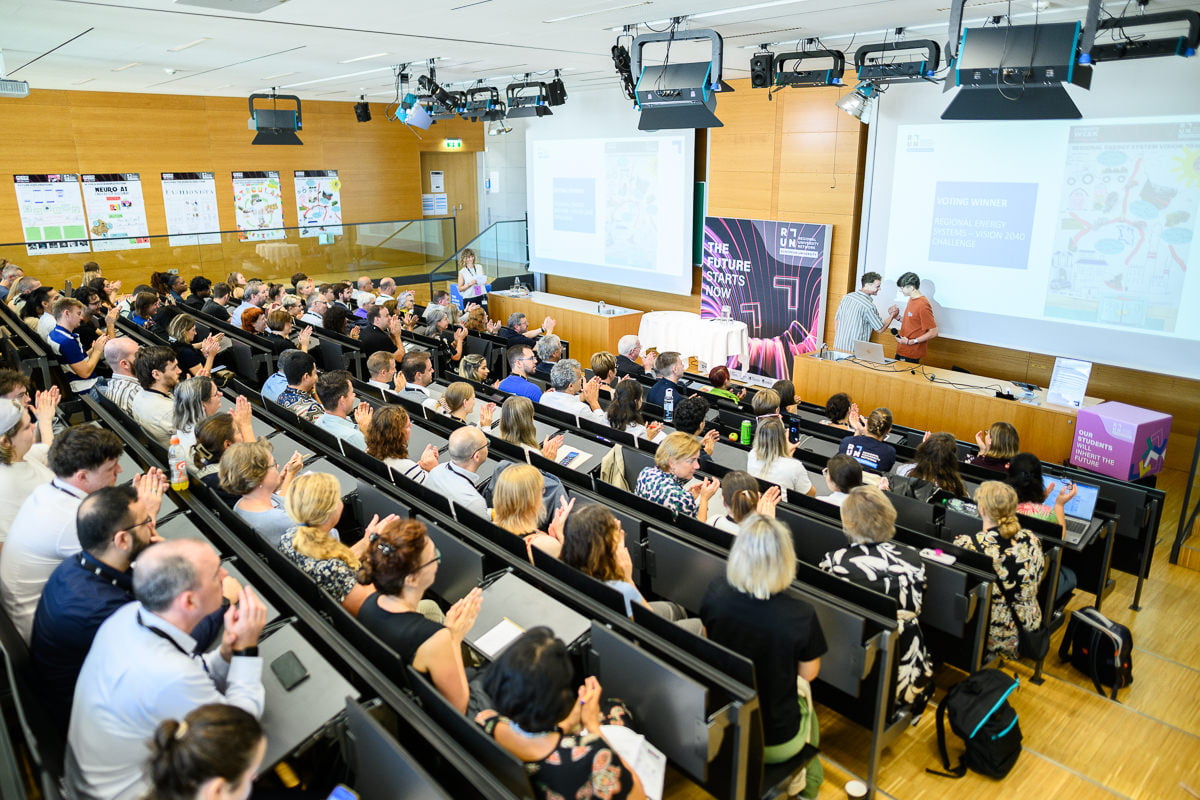
Every one of us dreams of a completely renewable energy system. The students of the Regional Energy System – Vision 2040 Challenge did not only dream, but they worked on it.
Innovative, sometimes disruptive, but always united in the European idea.
‘Imagine it’s 2040. You wake up in the morning in your badly insulated home, you want to go to your workplace – a coal Factory – you want to go immediately to your diesel-powered car, which is air-conditioned because it’s so hot outside. This is not what we want for our future and not what we want for our kids. That’s why we created this ‘Regional Energy System Vision 2040 for the province of Vorarlberg.’
The industry is one of the sectors with the most emissions and the highest electricity consumption. More than half of the resources it consumes to produce electricity, melt metals or other activities are gas. We want to substitute this gas so we can cut emissions and we can produce clean energy and the goods produced in this province are also green. We cannot do this with one resource, we need many different kinds of resources but we highlight four of them: biogas, biofuel, energy from solar panels and the waste heat.
Our goal is to make energy self-sufficient buildings so we don’t need any energy from fossil fuels to warm ourselves up. So we found out that we still have a lot of potential for buildings from solar energy. In 2040 we can raise up to 2,000 GHz. We need to educate people to have more solar panels on the roofs.
All of us need food, so for farming, we were thinking of new ideas, and new technologies, implementing without destroying our crops. The solution would be to do it by air with the use of drones which would spray all the nutrients needed in the fields instead of driving them with tractors that destroy the crops
Mobility is also an important factor because you have to drive to your farms, to get to your home and the workplace and we don’t want to do it by diesel, gasoline-powered cars which are not sustainable. Here in Vorarlberg, we have really good public transport but we can make the bus fleet completely electric and raise the number of buses, the frequency of the lines that travel even to smaller cities so everyone can take advantage of this new public transport system of course, trains as well. A lot of short distance travels here are taken by bike, an estimate around 20%, but we want to increase it by building bike roads to encourage biking by making it more atractive to people.
What will happen if we don’t act now?
At the bottom of our poster, we have a door where it’s written Dystopia 2040. Behind it, there is a graveyard. Our goal is to avoid it. We have to keep it closed, we have to act now, we have to start building our future, for you, for your kids, for your family, for their kids, for everyone.’
Student Council Presentation
Ana Rita Freitas, General Chair of the RUN-EU Student Council (StC) and Chair of the StC at the Polytechnic University of Cávado and Ave (IPCA), along with Marco Pavão, member of the StC at the Polytechnic University of Leiria (IPLeiria), represented the voice of all the students and presented the results of their annual face-to-face meeting, held on 3 September at the FHV.
Marco started by saying:
‘Hello everyone, I hope you had an amazing week, because we had! We, as the StC, are very happy to see the connection between students of all the SAPs and we love to see this diversity of cultures and customs, and this helps us to build new friendships and new networks. RUN-EU feeds us with new skills we need for future careers.’
He then highlighted the need to have free time in future SAP schedules to enjoy the company of other students and suggested that there is a wider variety of specific SAPs from different areas organised in different member universities.
About the RUN-EU achievements, he added:
‘We are very happy to hear that all the Milestones so far this year have been achieved. As the StC, we are ready to continue to support RUN-EU goals within our Institutions and collectively to achieve the next Milestones together.’
Ana Rita took the floor to talk about what the StC Chairs and Vice-Chairs discussed during the week:
‘Representatives from the StC had a meeting with the Governing Council and the proposal of having one contact person from the StC to the Presidents and Management Boards came up. Yesterday, the Chairs and Vice-Chairs elected one General Chair for the RUN-EU StC. This student will be the voice of all students, facilitate meetings between StCs and be the contact person with the Government Council. We are now restructuringthe Student Council organisation and are now starting to write the guidelines to follow for the next years.’
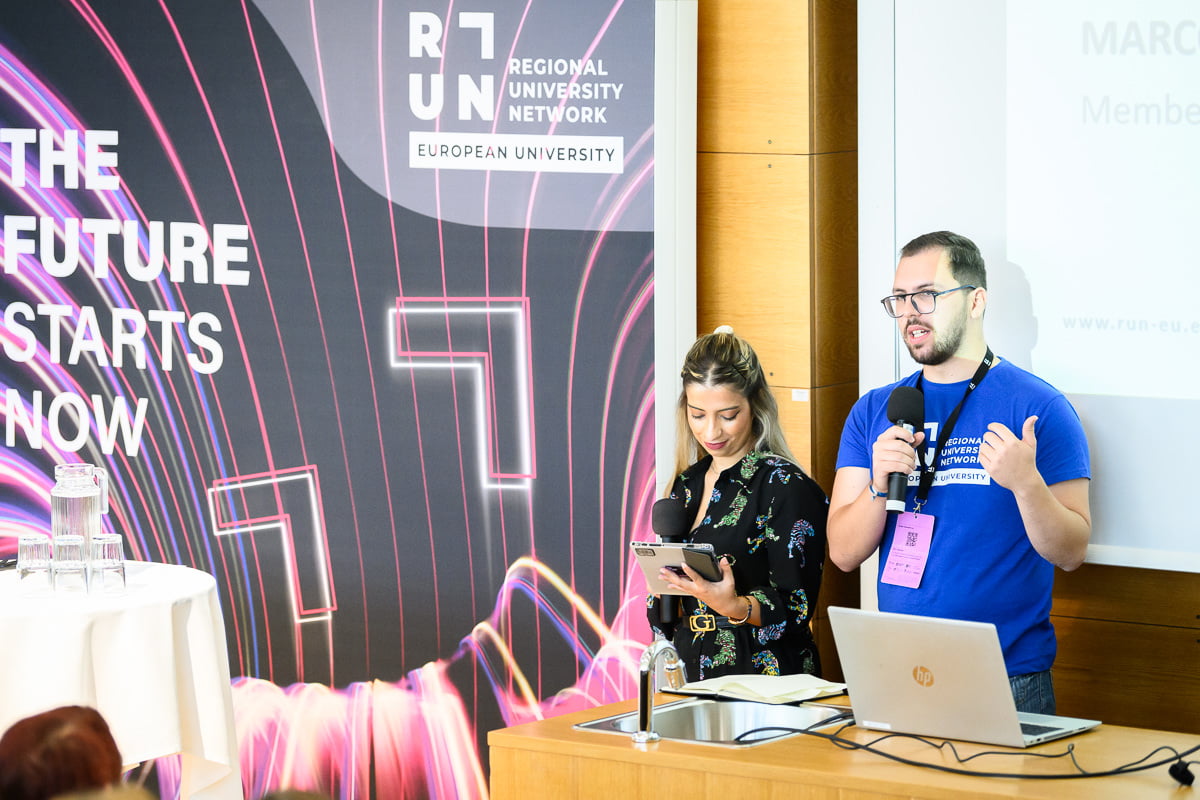
She wrapped up her intervention by saying:
‘I’m very honoured to be elected with a majority of the votes to be the General Chair, and I’m committed to continue working on the growth of this Alliance alongside students, staff, teachers, presidents, and everyone here. So, let’s keep moving forward together in this positive direction. And like we always say: We Are One, We Are RUN!’
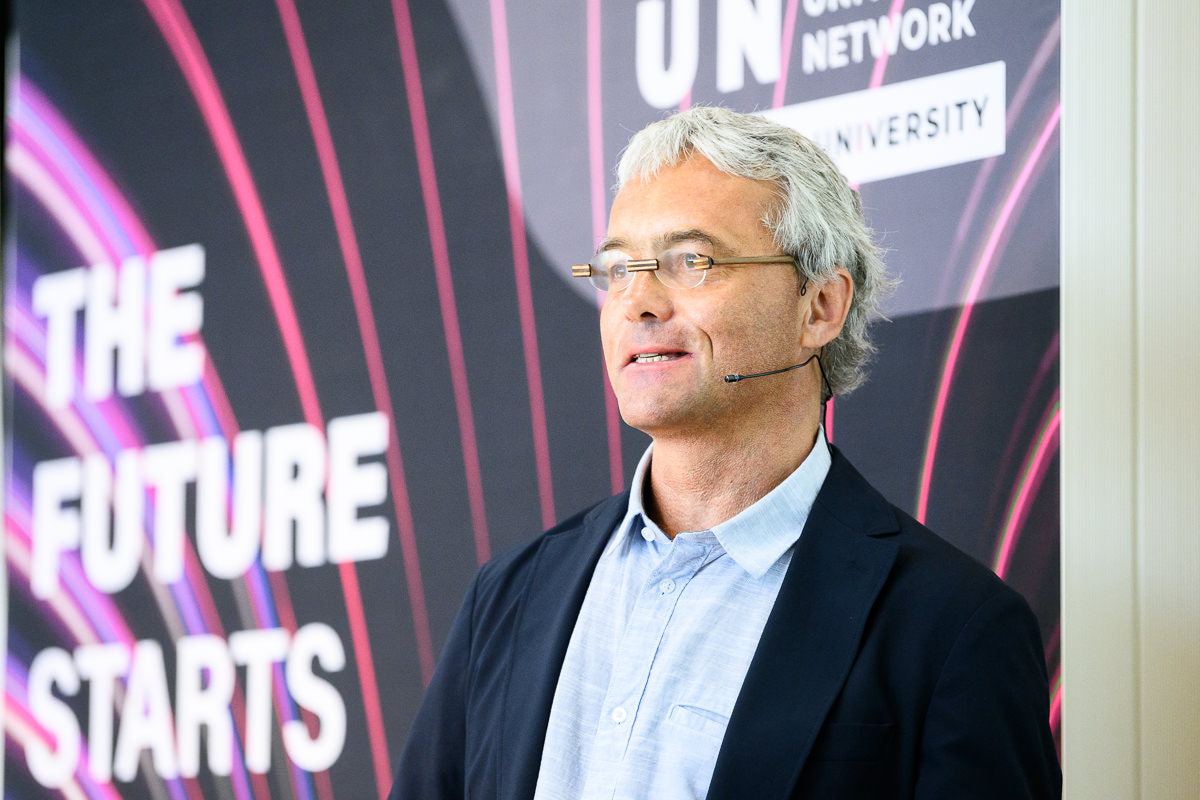
Keynote
Future Universities & Sustainable Regions for a Smarter Europe
How European University Alliances Enhance the Diversity of European Regions as Key to Impact Innovation for a Peaceful and Prosperous Europe
Hannes Raffaseder is an artist, a respected expert in media and communication and a dedicated academic leader.
He is the CEO/President of St. Pölten University of Applied Sciences, the President of EURASHE, and the Lead Co-ordinator of the European University Alliance E³UDRES². With his extensive experience in media, technology and education he plays a central role in promoting research and innovation initiatives.
Hannes is known for his interdisciplinary approach and his commitment to strengthening the collaboration between universities, industry and society.
In his very fun and inspiring keynote, he said:
‘Maybe this is the only important message from my wise words: if you speak about the future of universities in Europe, the only asset that we have is the diversity of our regions, the diversity of our small universities. So the biggest mistake that we could make in this initiative is if we apply a one-size-fits-all approach. (…) No, we have to do it vice-versa, we have to enhance the diversity of our regions, and the diversity of our systems. This is the only thing that will give us resilience for Europe. Diversity is key for innovation’
‘A very important thing, and you are doing it in RUN-EU, is we have to open from time to time, at least leave our classrooms. We have to build the bridges between the so-called analogue and the digital, the so-called real and virtual world. We have to span the boundaries between the more rural areas – which are so important for our quality of life, for recreation, for inspiration – and, of course, Urban Innovation Centres.’
‘We have to enable creative ideas rather than trying to enforce academic performance based on whatever KPI. We have to act in an engaging, and yes, also entrepreneurial way with various stakeholders from our societies, from our regions and on the European level. We have to promote open Innovation and collaboration for this kind of resilient and sustainable regions all over Europe.’, he concluded.
Associated Partner Advisory Board Presentation
The collaboration between the RUN-EU member universities and the regional stakeholders plays a crucial role in the development and success of our European Alliance.
Krista Taipale is the Director of the Häme EU Office, in Brussels, holds a function at the Regional Council of Häme region, in Finland, she’s a RUN-EU Associated Partner of HAMK and provided a summary of the annual Associated Partners Advisory Board meeting.
‘We all shared the feeling and the opinion that RUN-EU has great potential for the Associated Partners, may it be the Region, as I represent here, or the Companies or the Economic Development Centres or the Social Actors. There are plenty of opportunities we can do together.’
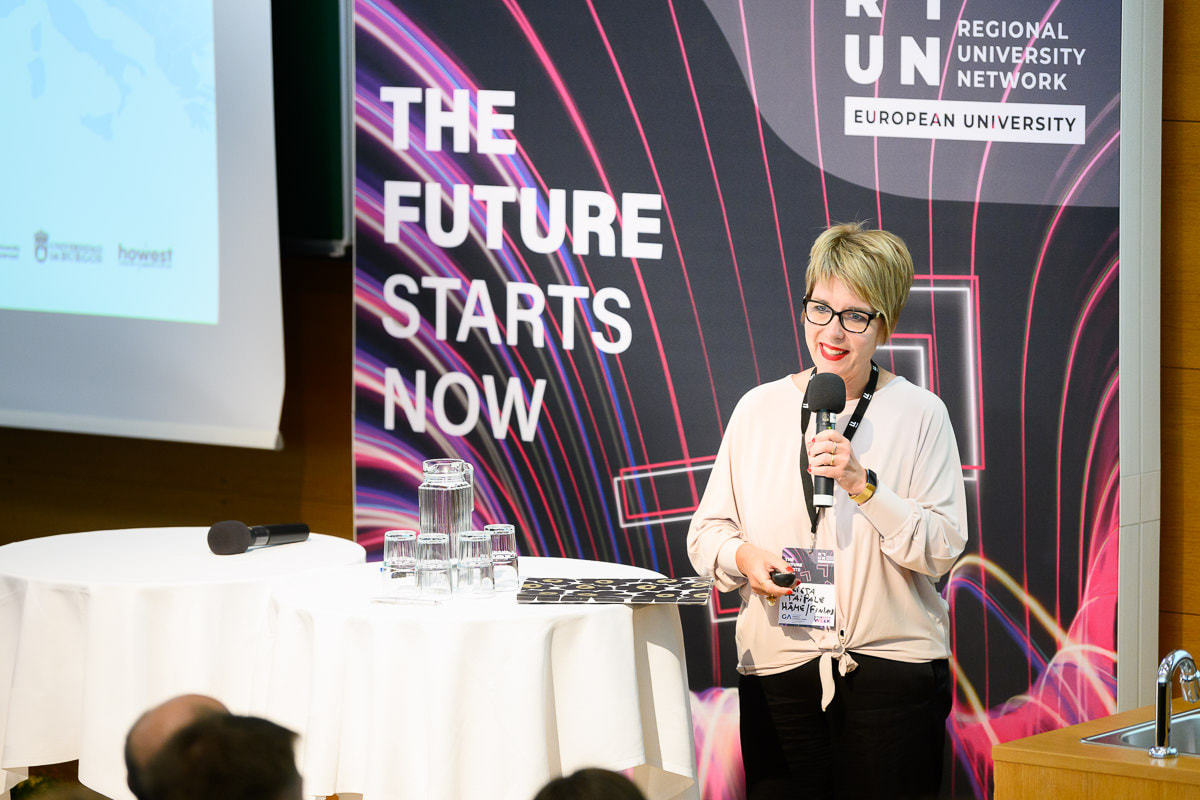
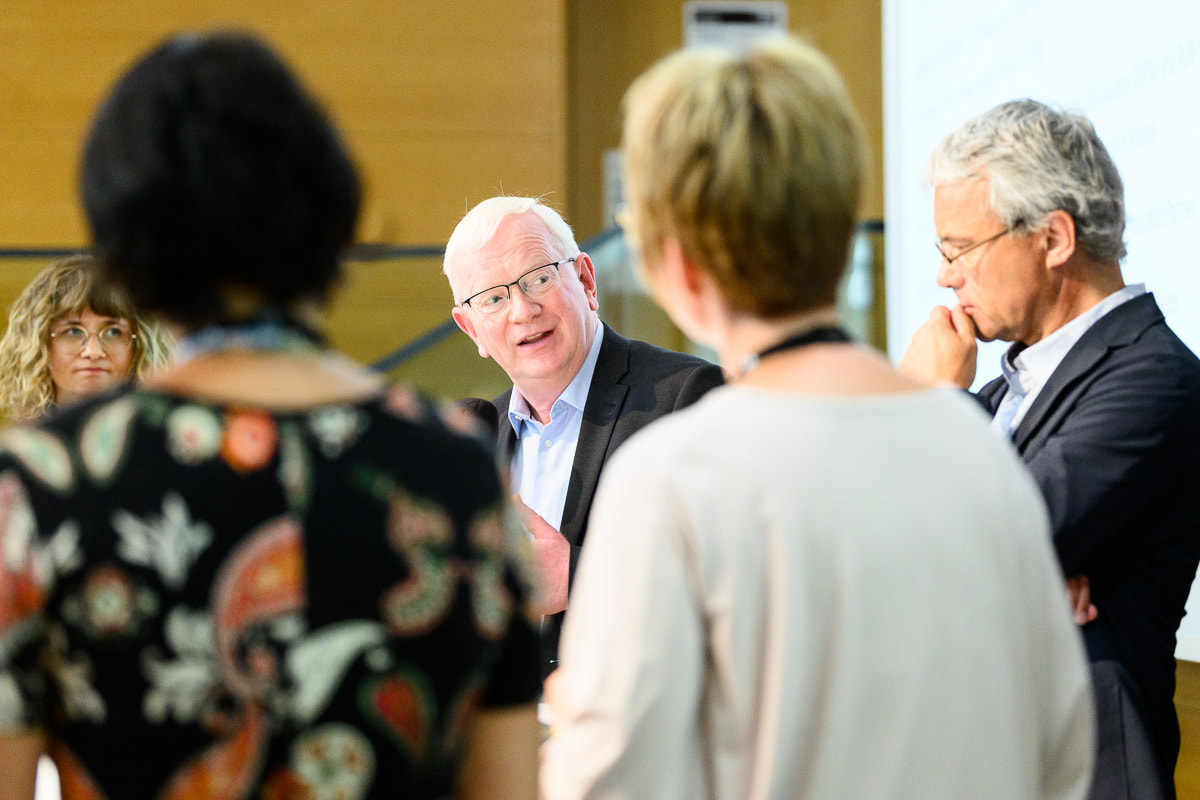
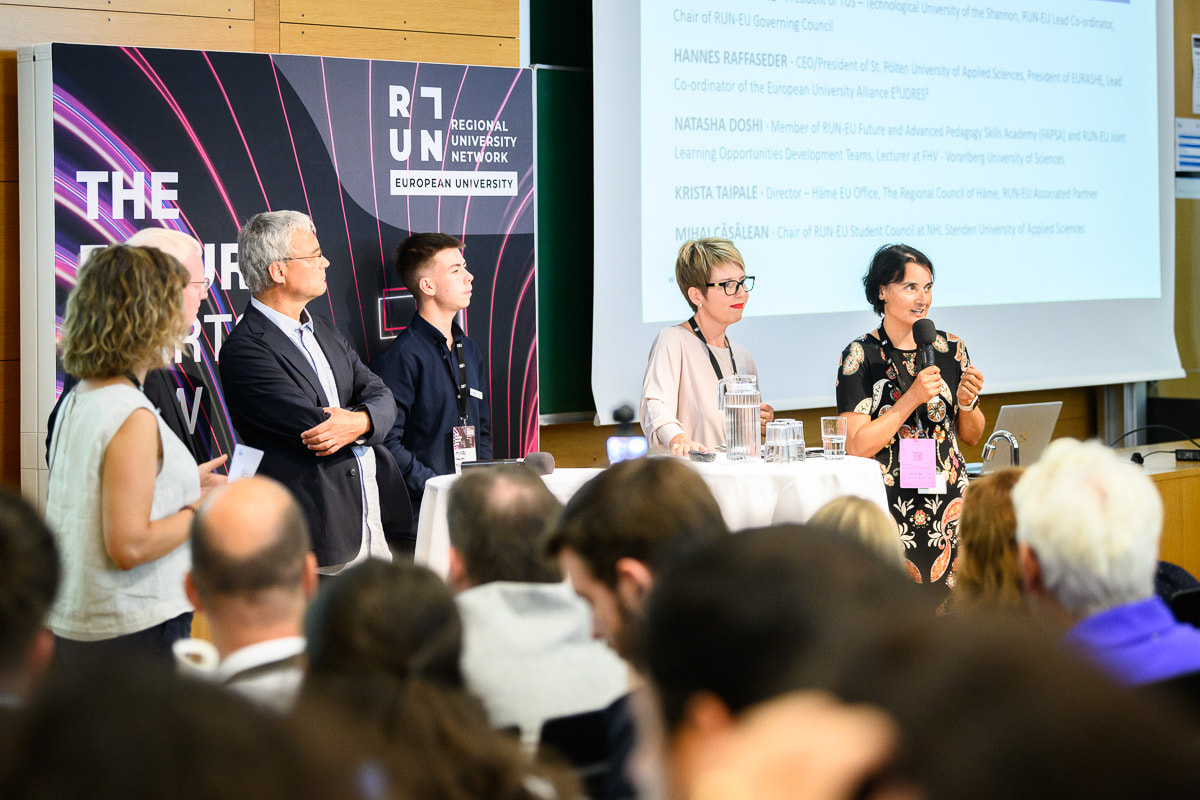
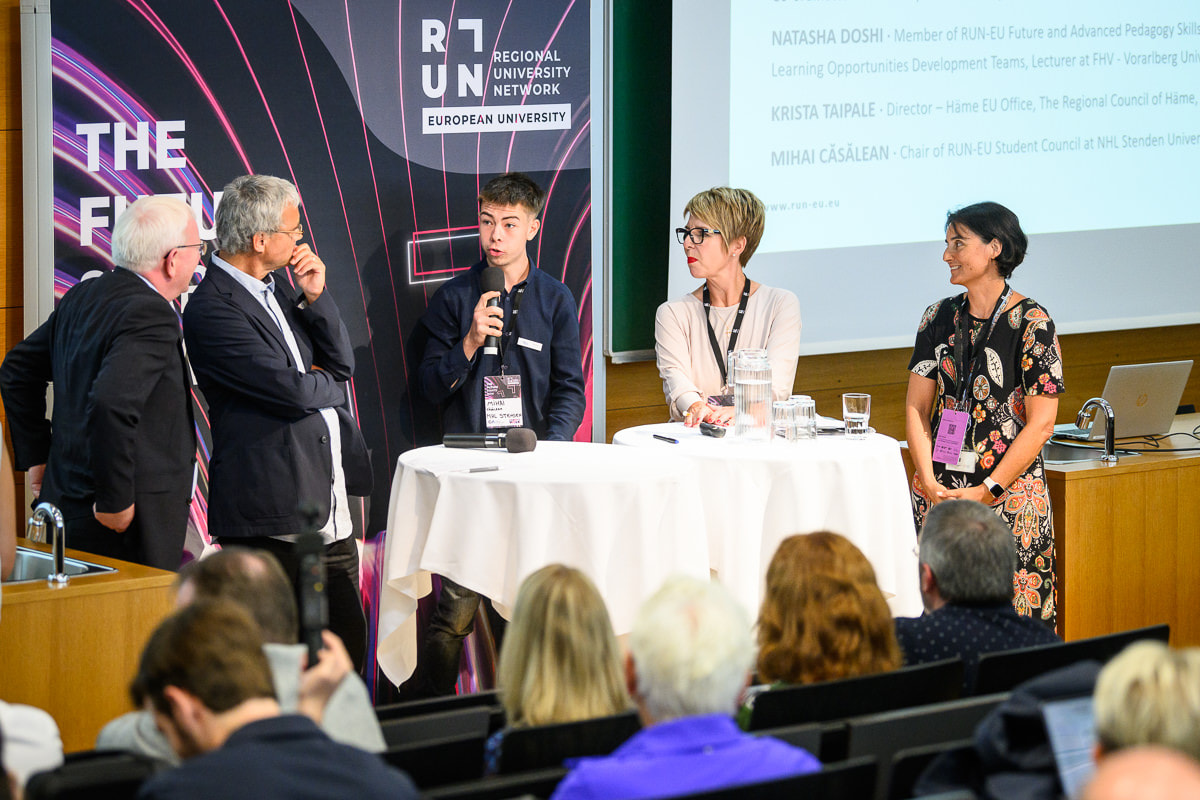
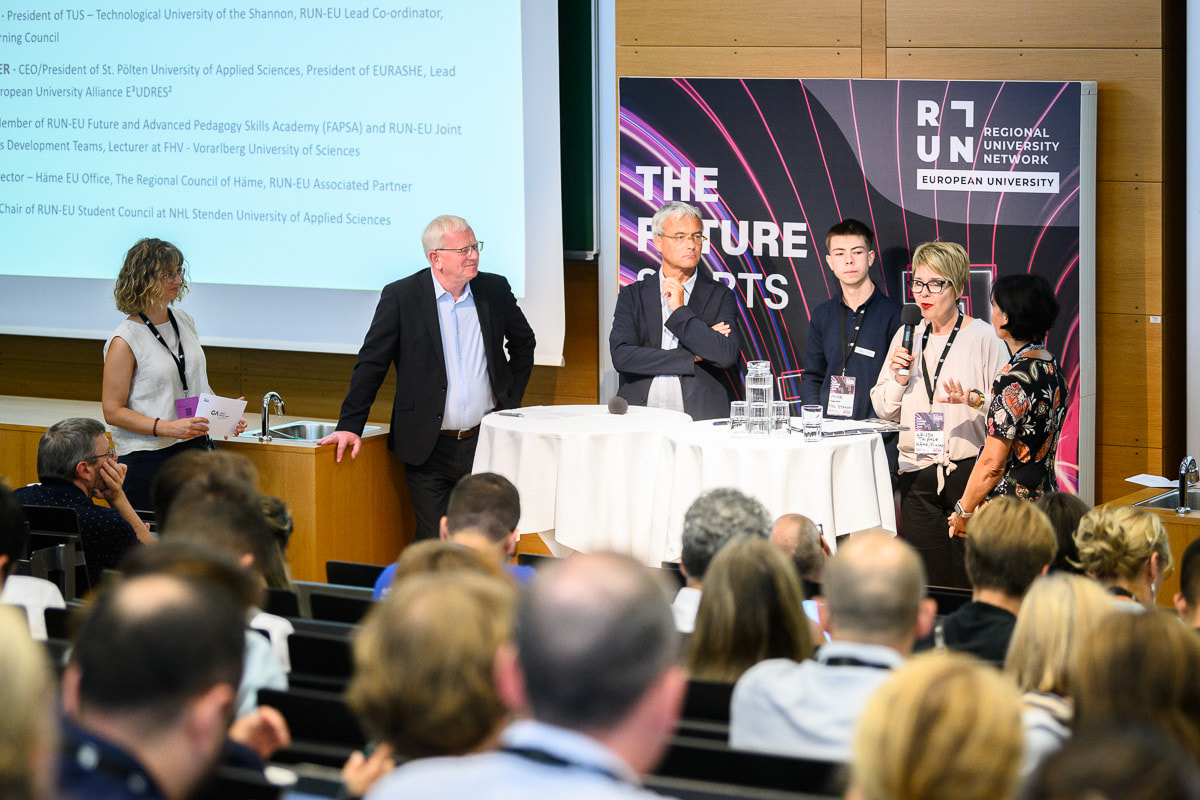
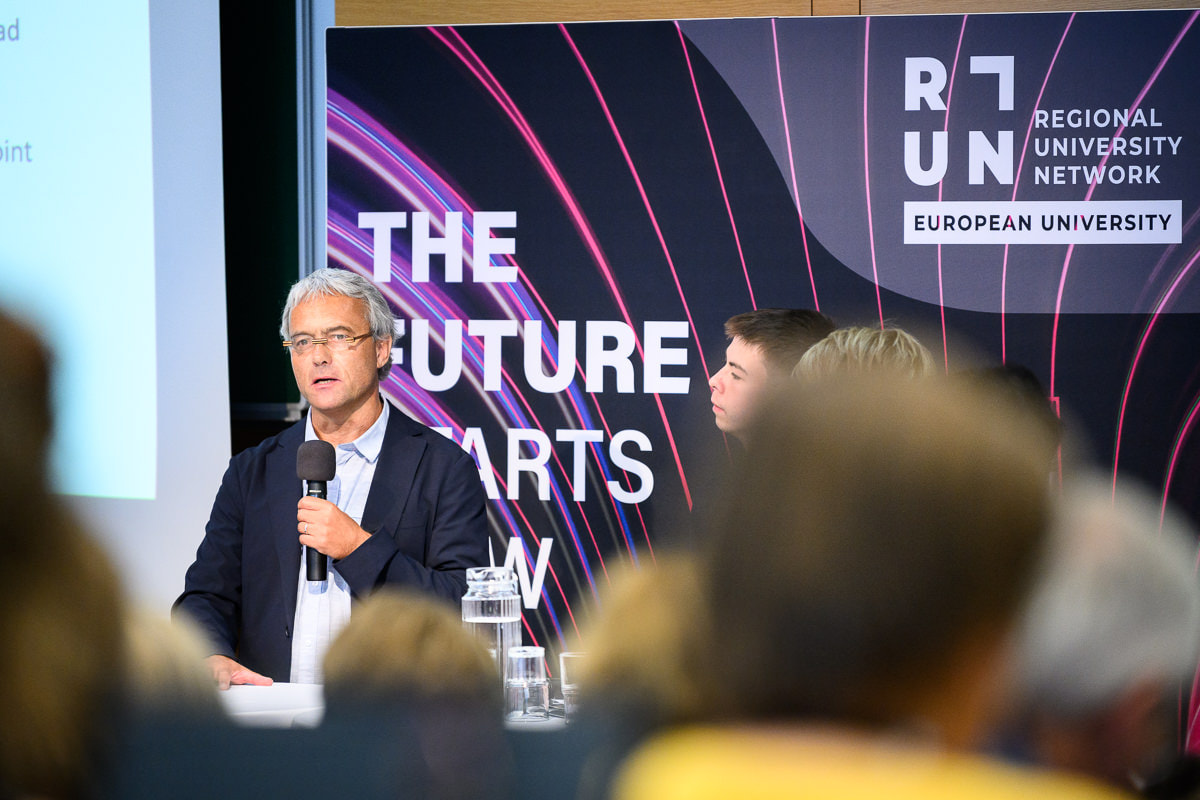
Panel Discussion
The RUN on Skills – How Do We Make Our Regions Fit For The Future?
The guest speakers for this panel were:
- Vincent Cunnane · President of TUS, RUN-EU Coordinator, and Chair of the RUN-EU Governing Council
- Hannes Raffaseder · CEO/President of St. Pölten University of Applied Sciences, President of EURASHE, and Coordinator of E³UDRES²
- Natasha Doshi · Member of the RUN-EU Future and Advanced Pedagogy Skills Academy (FAPSA) and RUN-EU Joint Learning Opportunities Development Team, and Lecturer at FHV
- Krista Taipale · Director of the Häme EU Office, The Regional Council of Häme, and RUN-EU Associated Partner
- Mihai Căsălean · Chair of the RUN-EU Student Council at NHL Stenden
The question asked to our panellists was: ‘What skills are needed to make a region fit for the future?’
Vincent Cunnane highlighted the importance of accredited diverse and soft skills that are transferrable and internationally recognised, talent retention in the regions, and lifelong learning relevance.
Natasha Doshi answered a question about her experience while teaching in SAPs, which skill has the highest demand among learners, why, and also about the relation it can have to their regional background. She pointed out intercultural communication. And then continued to describe how the topic usually is the point of interest at the beginning of a learning opportunity, but how collaboration, conflict management, critical thinking, creative thinking, and learning not just from others but also about yourself really fits in the regions.
Mihai Căsălean talked about the importance of communication as a soft skill, how everything is or relates to it, and how it’s something we all should get very good at. He continued by pointing out how RUN-EU is all about communicating and creating bridges between cultures, people, universities since the beginning and how it also means active listening and why we should listen to learn, to understand, and to be able to be more compassionate towards one another.
Krista Taipale addressed how the ability to continuously update skills and learn new things is extremely important and how RUN-EU has this mindset in providing it to our future leaders and skilled labour force. She added the importance of international communication skills from the perspective of the regions and the global world and how it plays a big role in intercultural collaboration. She then praised the RUN-EU students presentations: the future is in good handsand finished by saying that RUN-EU gives us an opportunity to make innovations, collaborations, and even dreams come true.
Hannes Raffaseder started by saying that only those who try the absurd achieve the impossible, so the impossible is one important skill. He then focussed on the very specific aspect that we are all humans and we measure almost everything and how we should value emotions, as it is a very important skill to show, and to deal with. Another point is self-trust and intuition, don’t minding making mistakes, and the importance of just going for it.
Referring to frameworks, the most challenging thing is to provide the ‘playground’ where students, staff, and administratives at research and education feel enabled and empowered to take on a new perspective.
RUN-EU Annual Report Presentation by WP Leaders
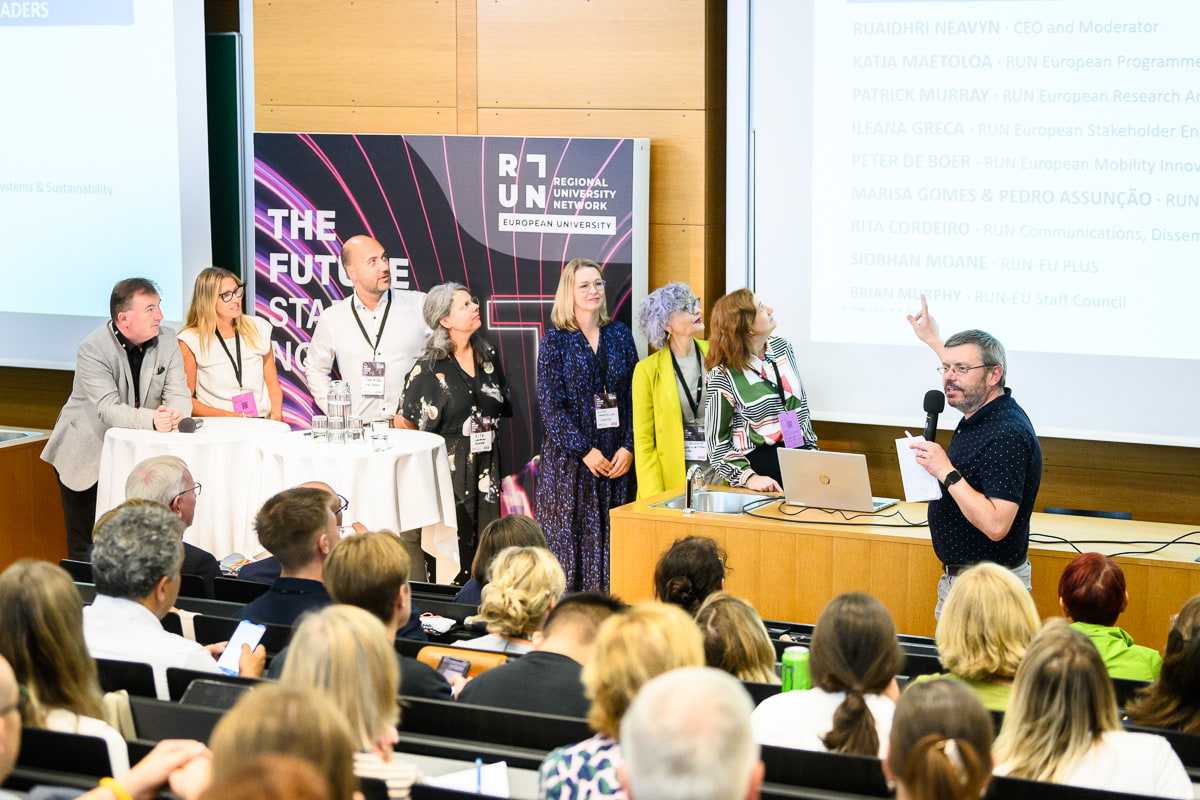
Rhuaidhri Neavyn, CEO of RUN-EU, moderated the panel of the Annual Report presentations.
The following speaker representatives presented the RUN-EU objectives, outstanding results, and the next steps:
- European Programmes Academy (RUN-EPA) · Katja Maetoloa · HAMK
- RUN European Research Area (RUN-ERA) · Peter Murray · TUS
- RUN European Stakeholder Engagement Centre (RUN-ESEC) · Ileana Greca · UBU
- RUN European Mobility Innovation Centre (RUN-EMIC) · Peter de Boer · NHL Stenden
- RUN Governance, Legal Status, Systems and Sustainability · Marisa Gomes · IPLeiria
- RUN Communications, Dissemination & Impact · Rita Cordeiro · IPLeiria
Siobhan Moane, RUN-EU Project Manager and RUN-EU PLUS Coordinator presented a video summarising RUN-EU PLUS achievements from 2021 to 2024.
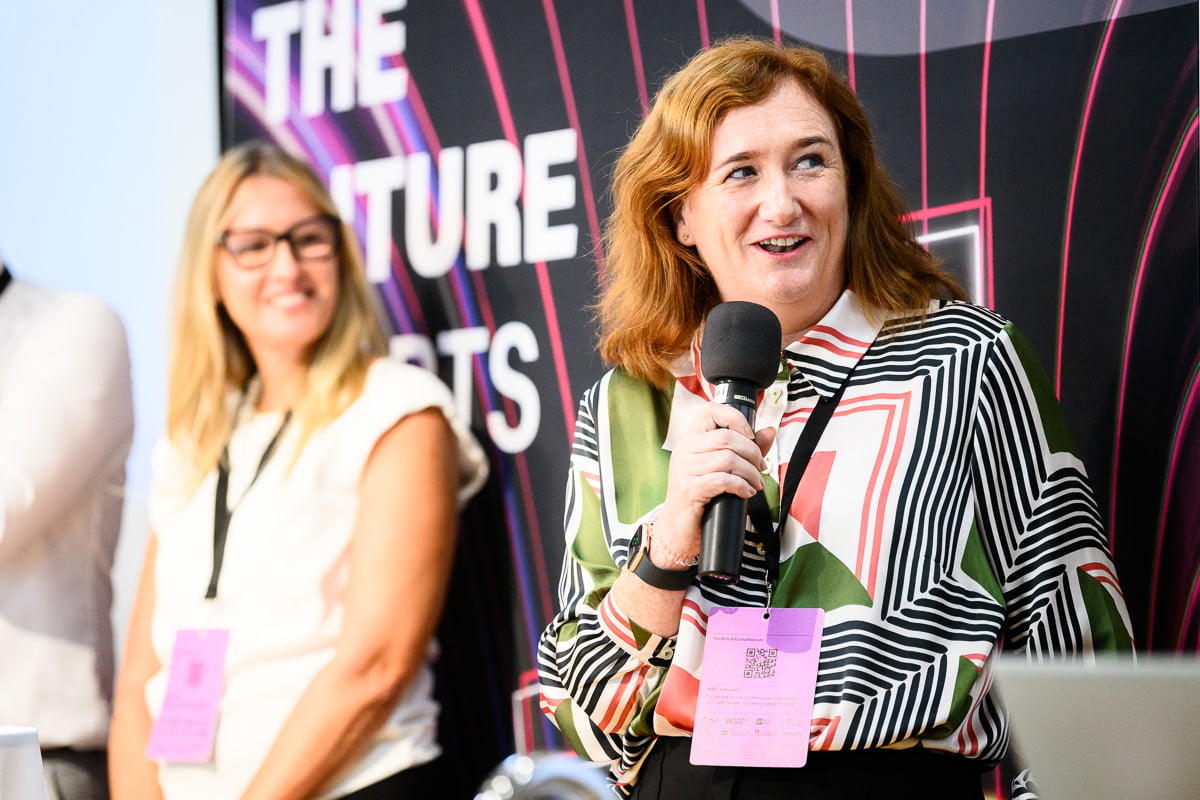
closinG session
The final session began with Rhuaidhri Neavyn, CEO of RUN-EU, highlighting the fantastic progress made over the last year and the commitment of Staff, Students, Executive Management teams, Presidents, and the working teams formed across RUN-EU in developing all the programmes.
He also set out some highlights for next year, announcing that RUN-EU is intensively looking for a new family member, a ninth partner who will come from Eastern Europe, followed by the announcement of a new shared IT platform that will facilitate communication across all RUN-EU Campi.
It will be a showcase of all the activities where students will be able to register, and access learning information, it will house all our new website development activities, but it also has another added advantage by being a standalone entity, a non-for-profit organisation and making applications as RUN-EU possible, a very important step forward.
Finally, he addressed the future sustainability plan for RUN-EU – and how the embedding of RUN-EU activities into the curricula ensures that everyone has the opportunity to participate, develop and engage in the programmes and activities – and the will to work with like-minded alliances.
And finished by thanking the RUN-EU community, with a special word to the Presidents who have taken the risk of being part of the alliance and went on to call the event organisers at FHV for a big round of applause.
Stefan Fitz-Rankl thanked the RUN-EU Department at FHV: Marijana Milošević, Frauke Dobers, Lisa Wagner, and Katrin Berchtold, as well as the rest of the 70 people involved for their commitment and brilliant organisation.
Barbara Schöbi-Fink, Vice-Governor of Vorarlberg, welcomed all the RUN-EU members and continued by stating how the week was also special because it marked the 30th anniversary of the Vorarlberg University of Applied Sciences.
FHV, which started with ten staff members and 45 students has grown into a beacon of Education and Research Excellence, hosting 400 employees and over 1,500 students across 25 study programmes today.
She continued by emphasising how the week’s meetings, discussions and Challenges were invaluable in advancing the future development of RUN-EU as a united European educational community, and how FHV sets the stage for the future and is at the forefront of Education and Research.
Stefan took the floor again to say that what was created four years ago with RUN-EU was similar to the beginning of FHV and expressed the wish that we all continue on this path, keeping the enthusiasm, the will and the passion.
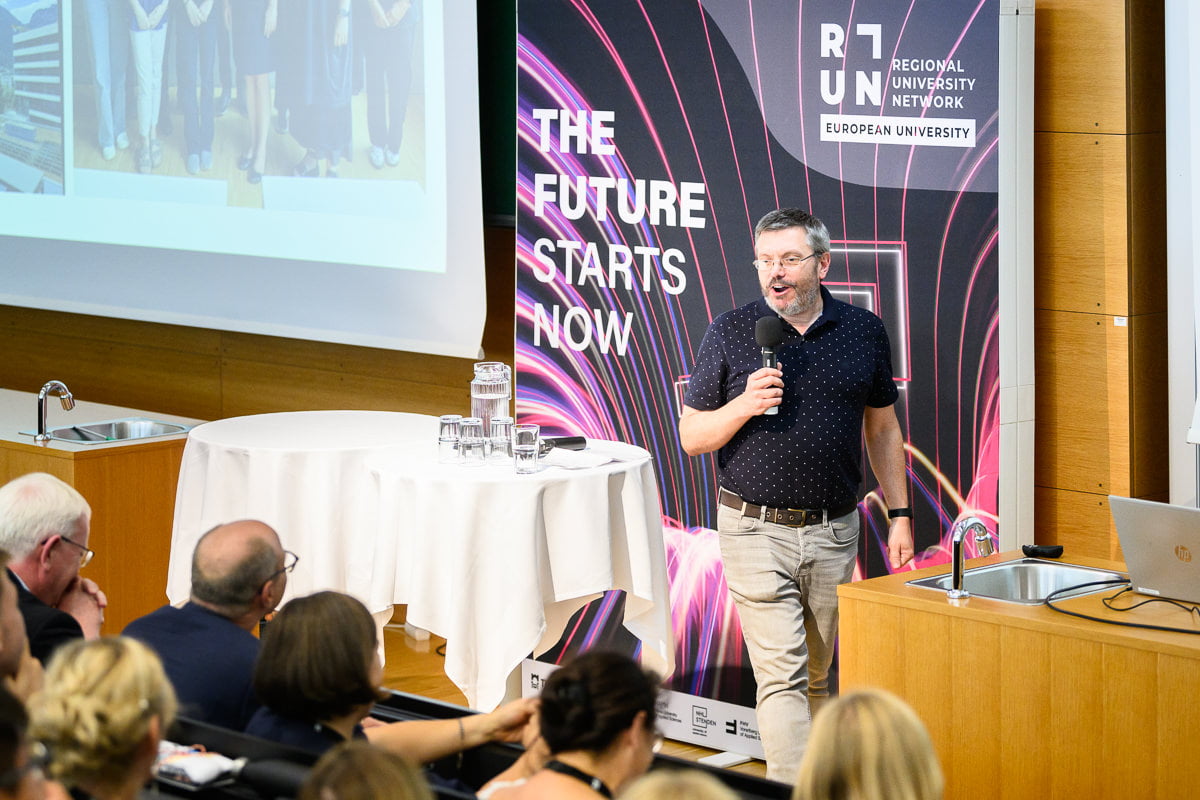
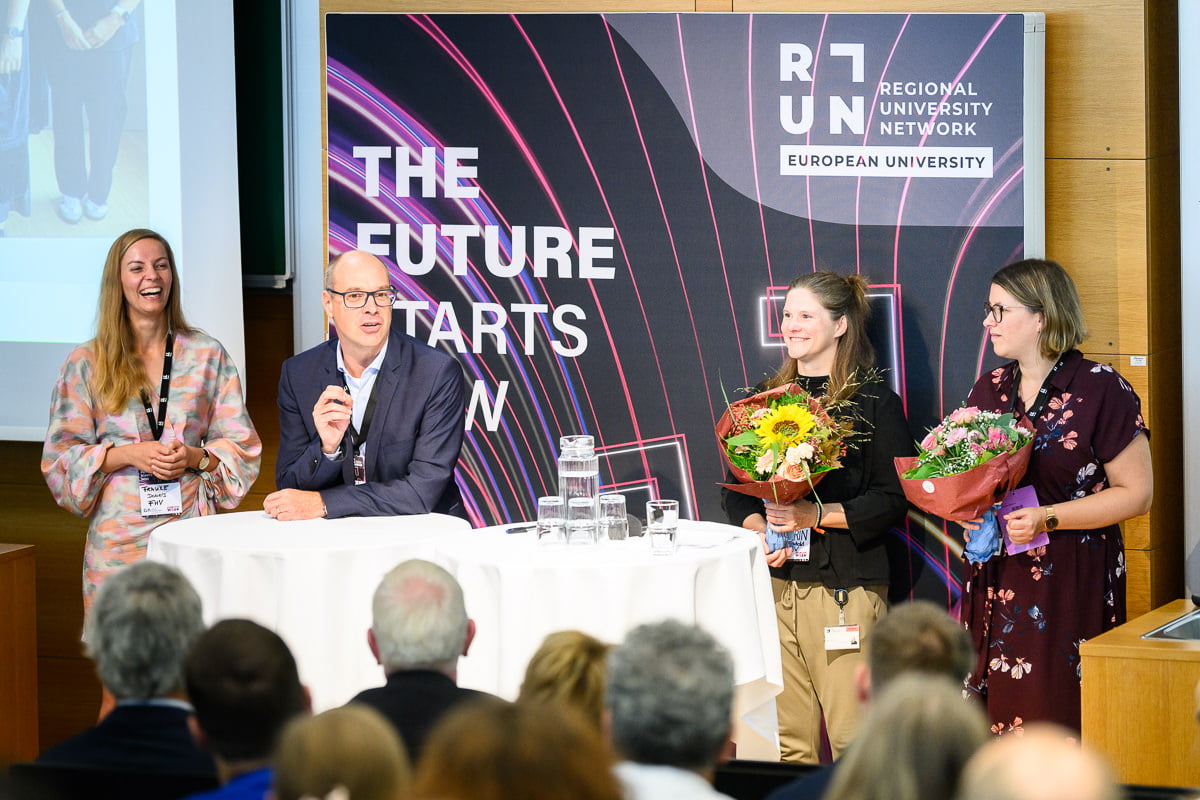
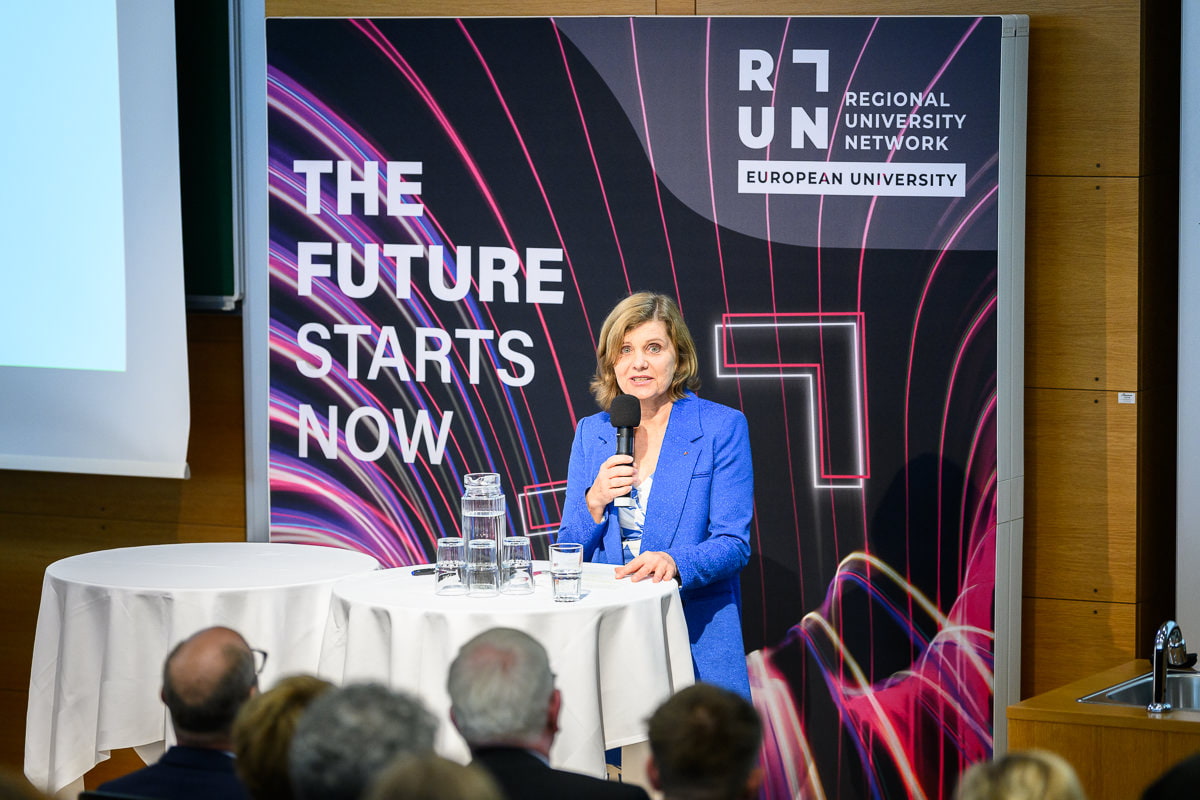
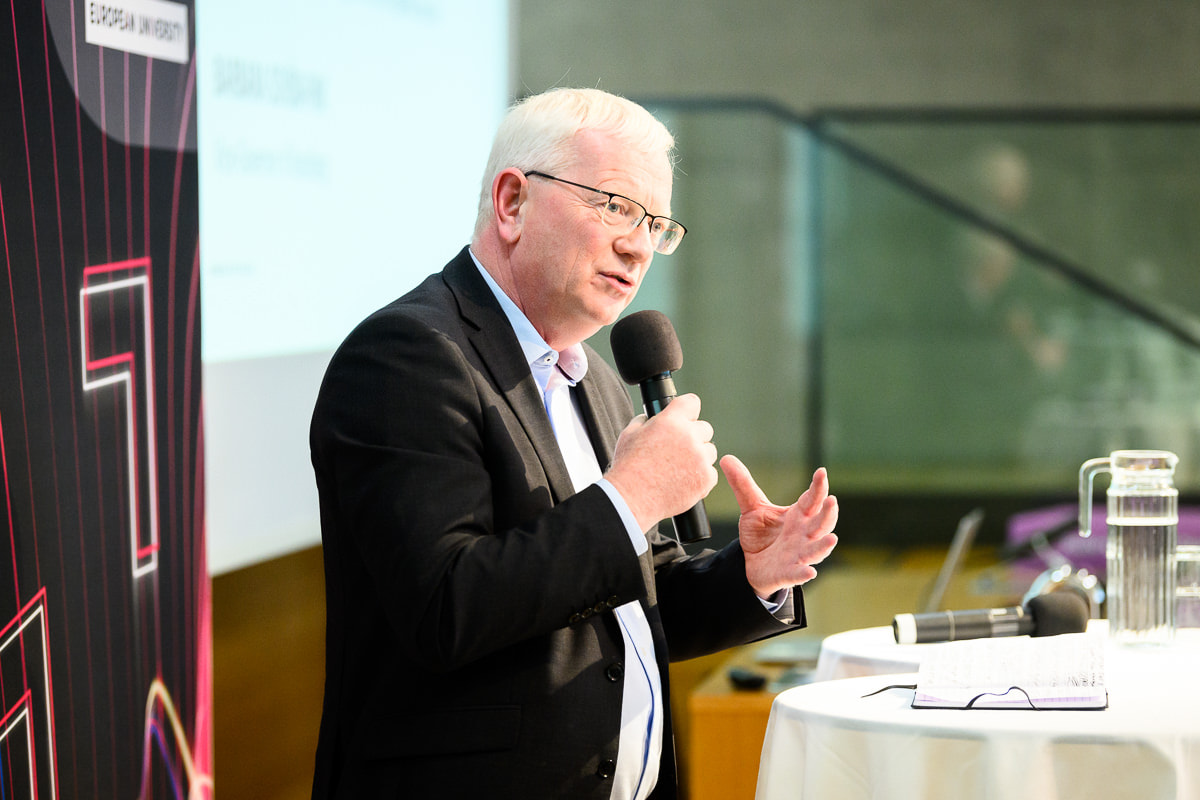
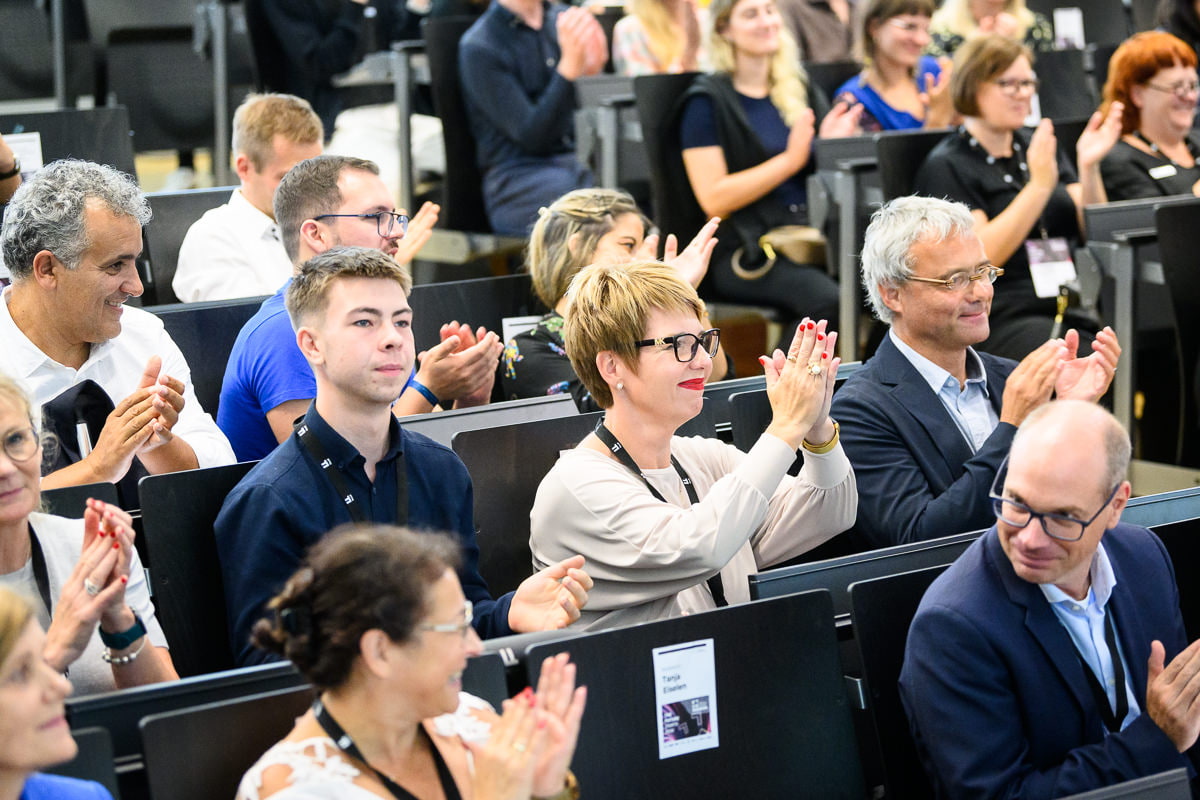
Vincent Cunnane closed the General Assembly with inspiring and passionate words.
‘It’s been an incredible week, but more than that, it has again shown the potential of this wonderful RUN-EU, our European University’.
‘What’s the special mixture, what’s the glue, what’s that horizontal that’s going to make us a true European University? That’s what our vision is, that’s what our ambition is. We’re going to shape the University of the future, we’re not taking it; we are disruptive, and we want to do that, and we are leading it.
We will ensure diversity. We don’t want to homogenise Europe; it would be the death of Europe. Diversity is and will always be our strength. That will shape the future, that will ensure success.
We are all pioneers, doing something that hasn’t been done before, but we’re also ambassadors. If you are part of it and you believe in it, if you want to be part of that shaping the future, talk about it! Talk about it in your networks, talk about it everywhere!
We expose European values, we expose internationalisation, we expose transnational, we expose diversity.
This is what we want, this is what we need, this is what we are doing.’
The next RUN-EU Students’ Week and General Assembly will be hosted by the Polytechnic University of Cávado and Ave (IPCA), in Barcelos, Portugal, in 2025.
A symbolic General Assembly and Students Week flag was handed over by Stefan Fitz-Rankl and Vincent Cunnane to Maria José Fernandes, President of IPCA.
